The Sybervision Book List
The Different Book Lists
Novels, Epic Poems and Legends
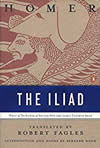 1. The Iliad by Homer (February 2004) [Book #25/305]
1. The Iliad by Homer (February 2004) [Book #25/305]
Also on the Norwegian list - The Iliad is the first of the two classical epic poems by the ancient Greek poet, Homer. The word "Iliad" is in reference to the ancient name for the city of Troy, which was "Ilium". This poem describes part of the ending of the Trojan War. Although, often thought to be the defining story of the Trojan War, it is actually missing most of the decade long war, most notably the fall of Achilles (via arrow to the heal) and the Trojan Horse itself. While reading the story, the poem often feels like a long list of names, akin to reading the Bible. Where "son of son of son" and so on are listed for every person of note, however, poem is fairly easy to follow along with. There is a huge problem with the story though, it doesn't have an ending. Following the funeral of Hector, the poem just ends. It picks up later with the travels of Odysseus in the Odyssey, but no conclusion to the war itself here. That is an odd way to end the book, especially since the book takes place so close to the end of the war already.
 2. The Odyssey by Homer (February 2004) [Book #26/305]
2. The Odyssey by Homer (February 2004) [Book #26/305]
Also on the Norwegian list - What is generally considered to be the sequel to The Iliad, the story of the end of the Trojan War continues after a short break in time. Written by the ancient Greek poet Homer, this story takes place at the end of the Trojan War as one of the war heroes, Odysseus, is trying to make his way home. However, after angering the god Poseidon, the trip home for Odysseus takes significantly longer than he was anticipating. He finally returns home after a ten year journey following the ten year long Trojan War. Along the way he almost gets eaten by a cyclops, does battle with many ancient monsters, and has to content with dangers near and far. This is the original traveling tale that so many tales have since been based upon. I personally find The Odyssey much better written and much more interesting than its predecessor. There is more going on in the story and the constant change in locations and events keeps the story interesting. My recommendation would to find a good translation, as that often makes or breaks a story.
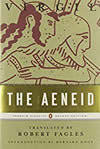 3. The Aeneid by Virgil (March 2006) [Book #43/305]
3. The Aeneid by Virgil (March 2006) [Book #43/305]
Also on the Norwegian list - We head back to the ancient classics with this Roman telling of the travels of Aeneas, a Trojan who ultimately became the ancestor of the Romans. The Aeneid feels like it was written to fulfill the Roman need to copy all of the Greek mythology, and unfortunately that is how this book reads. The first half follows The Odyssey almost to the point of going to the exact same places as Odysseus. The second half is much better and kind of reads as its own story, although it is still reminiscent of The Iliad. The one thing that The Aeneid did do that Homer skipped over was to establish the use of the Trojan Horse as a means for the Greeks to enter the city of Troy during the Trojan War. Overall, I feel that despite this being considered one of the major works of fiction from the ancient times, it feels too much like a rehash of Homer's much better duology. I would personally say you can skip this remake and stick to the original.
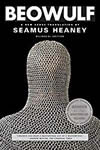 4. Beowulf by Unknown (June 2006) [Book #46/305]
4. Beowulf by Unknown (June 2006) [Book #46/305]
I should start off my review of this story with the premise that I do not generally like stories that are written in "Old English" or something close to modern English, such as Shakespeare. They take too much for me to get invested in the story personally and I find that detracts from my enjoyment. The story of Beowulf is about a famous man who slays several monsters and eventually gets killed while taking down a dragon. The story is rather difficult upon first reading because of the illusions created by the author. Unlike The Divine Comedy though, the illusions are not related to contemporary concepts but it is more of a figurative language. For example, instead of saying "ocean" it becomes a "whale-path." So a first reading can be rather a rather arduous task but future readings present more opportunities for understanding. Overall, the story itself is very simplistic but I believe it is the rich language which is used to describe the story which caused it to be placed on the "100 Greatest Books of All Time" list. Overall, this is not a particular favorite of mine, mainly because the language is such a barrier for me.
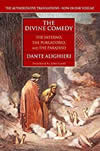 5. The Divine Comedy by Dante Alighieri (2002 - September 2005) [Book #39/305]
5. The Divine Comedy by Dante Alighieri (2002 - September 2005) [Book #39/305]
Also on the Norwegian list - The Divine Comedy is broken up into three separate parts: The Inferno, Purgatory, and Paradise. The story follows the poet Dante as he travels through each of the three afterlife worlds, meeting many of the people who once lived along his travels. By far the most interesting and most commonly read was Inferno. I had read Inferno in one of my college classes and I thoroughly enjoyed it. The visualizations were exquisite and remain with you years after you read it. I still remember everything that happened upon reaching the furthest depths of Hell. However, having read this in one of my classes I was probably spoiled, because upon reading the remaining two books on my own for this list, I found them dull and incomprehensible at times. The contemporary illustrations were also well beyond my understanding, even with an annotated book copy that helped explain some of that stuff. It got tedious though to bounce back and forth between text and description. It could have been my translation was not the best (a good translation is key), but it could also have been that having someone knowledgeable about the book made it that much more enjoyable. My suggestion with this series is to do it with someone who knows what is going on, like in a college class.
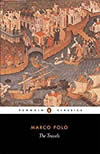 6. The Travels of Marco Polo by Marco Polo (October - December 2013) [Book #119/305]
6. The Travels of Marco Polo by Marco Polo (October - December 2013) [Book #119/305]
At first, I was rather intrigued by this book. I initially assumed it was a description of the adventures had by Marco Polo on his travels through Asia. As I read into the book it appeared to be more of the history of the Khans in Asia and mostly about Kublia Kahn. This part of the book was extremely interesting and the main story was heavily supplemented by notes on the text (at least in my Everyman's version of the text). The notes comprised ~25% of the 400 pages of the story and gave many clarifications and background on the text. However as the book went on, the majority of it just described city after city within China and the surrounding regions. Many with Chinese names that are not even close to the modern names, making it almost impossible to follow the travels without using the notes. On top of that, many of the town descriptions were heavily repetitive, making it a boring read after a while. I could recommend a condensed, simplified version of the "story", but the whole version is rather a slog to get through.
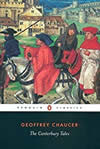 7. Canterbury Tales by Geoffrey Chaucer (January - March 2010) [Book #87/305]
7. Canterbury Tales by Geoffrey Chaucer (January - March 2010) [Book #87/305]
Also on the Norwegian list - I started off reading The Canterbury Tales by reading the introduction, which in my version states that "anyone who is too lazy to master the comparatively small glossary necessary to understand Chaucer deserves to be shut out from reading good books for ever," by Ezra Pound. Awesome. I had high hopes for this book in the beginning. My wife said it was great, she really enjoyed what she read so I'm all looking forward to it. Then I start to read it, and I don't understand it, at all. And this had nothing to do with the "small glossary" it was written with but with the fact that all of the words are misspellings of modern words, and not even consistently misspelled the same way. When you sound the words out you can make sense of what is going on but my mind doesn't work that way. It turns out my wife read a more friendly translation than my original script of the book. Mine looks more like this: "And daunced wel, he wolde nat come ayeyn..." (and danced well, he would not come again). So it makes sense, but it took me about 400 pages to understand it on my first reading (about 1/2 the book). Anyway, I ended up reading a summary of what was going to happen on Gradesaver.com, and then reading the tales in the book. This ended up being a lifesaver, because even if I missed a line or two I would still know what was happening. Generally, the book had its high points and low points. A lot of the stories were rather fun and interesting, but a lot of them were a drudge to get through (i.e. The Tale of Melibee). Then the final story, The Parson's Tale, seemed completely out of place and contradictory to everything Chaucer has stated before. After several tales of husbands and wives who sleep around he comes in with this sermon about the seven deadly sins, stating things like masturbation is basically homicide and if a woman were to indulge in sexual activity she should be stoned to death. It seemed so out of place that I felt it was on purpose, to throw off the reader. So overall, Canterbury Tales is really a story that does not need to be read straight through. I recommend if you do want to read it, to pick out the best sections and read them alone. It feels like Chaucer added some of the tales more for context around particular stories, rather than the actual enjoyment of reading them.
 8. Don Quixote by Miguel de Cervantes (January - June 2015) [Book #129/305]
8. Don Quixote by Miguel de Cervantes (January - June 2015) [Book #129/305]
Also on the Norwegian, Observer, and My Book lists - Whenever I hear anyone reference Don Quixote, it is frequently in regards to his fighting windmills, or riding around on an old horse with a fat squire on a donkey. Well, that is pretty much the first 20-50 pages of a 1,000 page long story. Preconceptions of the story do not really encompass the true breadth and depth of it. The story is about a man who feels he has been tasked with restoring knight errantry back to Spain and dupes a simple minded farmer to accompany him (Sancho Panza). When I first started to read the story, I felt like this was the story for me. It was serialized television long before television even existed. There were even phrases like "when we last left our heroes...". It seemed perfect for me. The translation I was reading was awesome as well (the Everyman edition). It was translated into a very readable sort of Old English, with all of the poetry and songs maintaining their rhymes. I assume the context and feel of the story was maintained even though the wording needed to be changed. And my version extended the feel of the novel to the translation itself. The novel is written as if it is a Spanish translation of an older text (Arabic I believe), where my English translator even had notes added on top of his translation by an editor. It definitely gives it a story handed down through time aura about it.
The problems I have with the story started pretty early though. I felt the story started to drag on really early in the first part. Adventures seemed to take forever; there were many side stories that added little (if anything) to the overall narrative, and I just felt the pace of the story slowing down dramatically. I felt I needed to trudge through most of the middle part of the novel until hitting the second part. When I really started to enjoy the story was during the last third of the novel, when the story became self referential. The first half of the novel was apparently published earlier and characters within the second half of the story had often either read it or had heard of it. There is even parts where a real life sequel to the first book was published by a different author and the characters in the book go out of their way to prove that book to be a false sequel. It's actually pretty meta. As for the ending: it felt very, very rushed. The ending could have been placed at any point in the book and still have fit, as there was no real build up to it during the narrative. It would have been better if certain story points (mainly Dulcinea del Toboso) were even addressed during the ending instead of just dropped as if she never even mattered. Overall, I would say the story was actually quite a bit of fun when it started to pick up during the later half but an abridged version of the story may be the way to go for many people (although I personally refuse to go abridged).
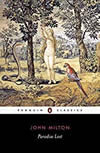 9. Paradise Lost by John Milton (November 2016) [Book #140/308]
9. Paradise Lost by John Milton (November 2016) [Book #140/308]
I had personally dreaded reading Paradise Lost, simply because most of the epic poetry on the list becomes dull and wearisome rather quickly, and pretty hard to understand through most of it. I was pleasantly surprised by Paradise Lost, at least in the beginning. The story is broken up into 12 Books, with each book lasting about 30 pages or so. My version of the book had illustrations by Gustave Doré, which gave the narrative a bit of a break and helped with the understanding quite a bit. However, the most import part aspect of the reading, was the fact that Milton provided a summary of at the beginning of each Book. That way the reader could more enjoy the prose instead of getting mired down in the text trying to figure out where the story is going (or even what was happening or where you were in the narrative). The story of Paradise Lost is not simply the telling of how Adam and Eve got kicked out of Eden. Instead it recounts everything that happened from the fall of Satan, to giving a "vision" of the future, through the birth of Jesus. My favorite part of the book had to be the first half, where Satan is seen as a rather tragic character. Milton perfectly weaves in Greek and Roman mythology, making this story feel much more mythical than it is often depicted. However, the story takes a steep decline once we get to the point where God is chastising Adam and Eve. Eventually taking us to where Adam is shown a vision of the future (essentially the rest of the Bible) and he becomes much more content with being cast out into the world. I understand that this is based on the Bible, making the story source hard to debate, but the degree of punishment seems awfully petty. It's all based on Adam and Even breaking the rules and being told "...that to obey is best..." and women are essentially too weak to be trusted to do much. It gets to be a bit much by the end. Overall, the prose was fun to read and the first half of the story was great (as a mythology lover myself), but by the end, I was done, and getting more and more annoyed as it dragged on.
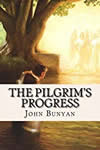 10. The Pilgrim's Progress by John Bunyan (December 2016) [Book #142/305]
10. The Pilgrim's Progress by John Bunyan (December 2016) [Book #142/305]
Also on the Observer list - I will start off my review of Pilgrim's Progress with my general review. This is an overly heavy-handed biblical allegory written at an elementary level. First off, almost every single character in the book is a trait that defines the character, i.e. Mr Honest, Faithful, Mr Worldly Wiseman, etc., where sometimes the traits don't even make sense based on the way the character acts. It is as if the author didn't know the definition of some of the words he used. Second, the story is written very poorly. It feels like the writer has never actually written a book before. Phrases are repeated line after line and the setup of the book doesn't make sense. It is written as if it were a play, with the characters name spelled out where they should talk, but then it has a phase like "so and so says this." for instance:
"Christian: 'Truly,' said Christian, 'I do not know.'"
Why would you call out the character that is going to speak, then write again that they are speaking? And the story is beyond hypocritical. Maybe it is because I am not a religious person, but the main character, Christian, complains about nobody listening and doing what he tells them they should do, but he doesn't do anything they tell him he should do. Do as I say not as I do? Every single character is one note, and the women characters in the second part of the story are next to useless. Why make the second part centered around Christian's wife (whom he left willingly) to just make her a useless character that needs everyone around her to do everything for her? In short this is a overly heavy-handed, misogynistic, racist, piece of garbage that I am thankful that I will never have to read again.
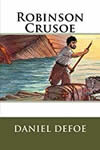 11. Robinson Crusoe by Daniel Defoe (September-October 2008) [Book #78/305]
11. Robinson Crusoe by Daniel Defoe (September-October 2008) [Book #78/305]
Also on the Observer list - While I was reading Robinson Crusoe, I definitely got a Cast Away feeling about the book. I know many people thought that Cast Away was a boring movie, and the book came across the same way. It just seemed to drag on forever. At the beginning of the novel I kept waiting, and waiting, for him to become ship wrecked, and then when he finally was, nothing exciting happened. For a book that seemed to be billed as an action-adventure novel, I got none of that through the narrative. It's not a totally bad book and I rather enjoyed the plot, I just felt it was really slow at times. I found it amusing how, no matter what Robinson did, he seemed to end up with the short end of the stick. One major problem I had with the book though, was that Defoe constantly referred to the Native Americans/Native Islanders as savages and cannibals. I can see how Crusoe might have thought of them that way at the beginning of the story but even after meeting them Defoe continued to show them eating other humans. Sorry, but cannibalism was not that widespread. This is a definite pass for me.
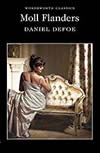 12. Moll Flanders by Daniel Defoe (September 2015) [Book #131/305]
12. Moll Flanders by Daniel Defoe (September 2015) [Book #131/305]
I was hesitant to start reading Moll Flanders because Defoe's other work on the list, Robinson Crusoe, didn't really strike my fancy. I found Robinson Crusoe to be overly dragging and not that upbeat. Well, now we come to Moll Flanders and I have several of the same criticisms. Although the book is only 340ish pages long, it seemed to drag on forever. I could be reading twenty minutes and it felt like an hour. Defoe is often very repetitive, not only with small portions of text, saying almost the same bunch of sentences verbatim a few paragraphs later, but the plot itself was on a never-ending cycle of repeat. The story follows a woman who was raised as a cast off from a prisoner. The first third of the novel deals with her repeated marriages, which needless to say, got old really quickly. The second third of the novel actually got me back into the book. Although, this was also a bunch of the same, over and over again, I actually became interested in the character for once in the story. The character herself claims in the book this was because of people enjoy reading about her wickedness. I'm not sure if that was the case or if the author actually made the character interesting for once. The problems resurface again in the last portion, where the character is "redeemed". Even though she is redeemed, I never, ever, get the impression she is ever sorry for what she did and even remotely changed her ways. She was lying and manipulating people right up through the last page of the text. Overall, I am often harsh on books where it is difficult to get into a book because of the writing style. Defoe's writing style is fine, it's just his plots are overly redundant and slow paced. I can't recommend this story to anyone, sorry.
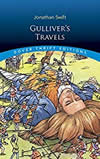 13. Gulliver's Travels by Jonathan Swift (2002) [Book #18/305]
13. Gulliver's Travels by Jonathan Swift (2002) [Book #18/305]
Also on the Norwegian and Observer lists - Gulliver's Travels is another of my "I had to read this in college" books that I need to go back to sometime when I have the chance. I read this book towards the end of my undergraduate career and getting nearer to when I started this book list in earnest. I had found the book very enjoyable that superficially was a fantasy book but in reality was a political commentary, very similar to how Pratchett writes his Discworld series. The main plot of the story follows Gulliver as he travels through many fantastical islands after he is the victim of a shipwreck. These islands includes races of tiny people, the Lilliputians, a race of giant people, a flying island, immortal people, and a race of talking horses, among others. Throughout it all he is forced to face the realities of his world when confronted with these fantasy situations. Gulliver's Travels is considered to be one of the greatest masterpieces in the English language and I look forward to revisiting it someday.
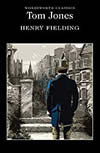 14. Tom Jones by Henry Fielding (May - July 2008) [Book #73/305]
14. Tom Jones by Henry Fielding (May - July 2008) [Book #73/305]
Also on the Observer and My Book lists - I found that although Tom Jones is a rather long book (my copy was over 850 pages) I greatly enjoyed reading it. The author is more of a narrator than an impartial observer. He readily makes comments throughout the book that makes you feel like you are sitting by a fire listening to him relay the story. It was definitely a different approach than most I have read and I greatly enjoyed it. The story was exquisite. It is about a bastard, Tom, who was abandoned by his mother to be raised by a very benevolent man. Although, I did not readily agree with some of the lessons at the end of the book (like how birth makes more of a difference on who the boy is, not just his character) I still enjoyed it and the ending did bring a tear to my cheek. Throughout the story the author kept making Tom's situation worse and worse and I thought that there was no way to bring him back in a believable manner, but it worked out rather well in the end. I definitely enjoyed this book and recommend it to anyone with a few months to read it.
 15. Candide by Voltaire (December 2007) [Book #68/305]
15. Candide by Voltaire (December 2007) [Book #68/305]
Candide is by the philosopher Voltaire, whose primary concern was optimism. Ironically though, the book turns out to be rather depressing, yet cheerful, at the same time. I am not sure how, it just does. It is written rather like a children's story, where there are very little embellishments and the characters zip around from place to place in a rather short time frame. But there are a lot of deaths (or supposed deaths), rape, war, slavery and other "adult" concepts making it definitely not a kid's story. The point of the story, I believe, was so that Voltaire could express his distaste for practically everything. This includes religion, war, and people's intolerance of each other (although he expresses his own intolerance rather well, a bit hypocritical). But anyway, the story is a rather interesting read, short (always a plus when your reading 300+ books), and I enjoyed it, but not enough to go on my personal greatest books list.
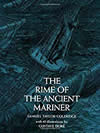 16. The Rime of the Ancient Mariner by Samuel Taylor Coleridge (April 2012) [Book #105/305]
16. The Rime of the Ancient Mariner by Samuel Taylor Coleridge (April 2012) [Book #105/305]
Also on My Book list - Before I started this book, I was expecting something in "Old English" similar to Beowulf and Shakespeare, neither of which I really enjoy all that much. However, this was much different. It is written in the Old English style but in such a way that it it understandable for the most part, although I admit I did have a little difficulty with the beginning. This was the fastest read I have had on my list to date and I can't imagine anything taking less time. I read this in about 20 minutes and while I was reading it, I found that I needed to say the words aloud to better understand them. This started as mumbling the words and eventually with me proudly stating all of the lines with gusto. Simply, the story was about a mariner who kills an albatross while sailing around, dooming all of his shipmates. I found the story very well written with a good moral; don't bite the hand that feeds you. Overall, a definite recommend.
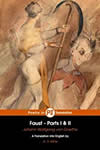 17. The Tragedy of Faust by Johann Wolfgang Von Goethe (September 2014) [Book #125/305]
17. The Tragedy of Faust by Johann Wolfgang Von Goethe (September 2014) [Book #125/305]
Also on the Norwegian list - Upon reading the first few sentences of Part 1, I was thinking, "Yea, I can really get into this". Part 1 was written in a poem like style very similar to The Rime of the Ancient Mariner, which I also loved. So I could see some promise in this. Then the story shifted and it mimicked Book of Job, which I didn't like, but I felt the concept was good and could see where they could improve upon it. Later on, the story morphed again, this time feeling very much like Dante's Inferno. Another story that I rather enjoyed. So in general, I had some promise for this story. Throughout Part 1, I was riveted and excited to see where the story went. When I reached the end of Part 1, the way several things were revealed was amazing. Initially I had thought we were supposed to guess at what happened but then the author revealed what happened afterwords, letting the information flow out in an unexpected way. Very enjoyable and satisfactory. IF the story had ended after part 1, this would be a 100% recommend. However, it didn't. The story of Faust is written as a play, although there are so many characters at some points I can't imaging it actually being acted out. Faust is a scholar who makes a deal with the devil, another main character, in exchange for excitement (as I interpreted it). He uses the devil throughout the story in order to get his way and eventually ruins a girls life. And so ends Part 1. Part 2, was published after Goethe's death and feels in many ways, like someone else wrote it. Or at the very least, like a different story. The plot is all over the place, sometimes it has Faust, but often it doesn't. The text is difficult to understand at times, perhaps due to the translation, more likely due to the story. At least there are some weak threads which tie back to the first part, especially the image of a beautiful girl seen in Part 1, who reappears for a large portion within the middle of the story. However, the story is barely intelligible and doesn't contain the magic emphasized in Part 1. So in summary, Part 1 is a definite recommend, but I personally can find no reason for anyone to read Part 2. There is a wrap-up to the Part 1 story within Act V of Part 2, but really, it isn't all that fulfilling.
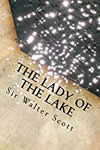 18. The Lady of the Lake by Sir Walter Scott (November 2014) [Book #127/305]
18. The Lady of the Lake by Sir Walter Scott (November 2014) [Book #127/305]
The Lady of the Lake is a story written as a rhyming poem where, for the most part, each line is eight syllables and every two lines rhyme throughout the entire poem. This structure is often interrupted though, when other aspects of the story take place, such as someone singing a song where the structure would change to every other line rhyming, or some other poetical construct. Structurally speaking this poem is a marvel to read. The poem is laid out fantastically and it is easy to get lost in the words on the page. Unfortunately, this is also a detriment to the story because I found it extremely difficult to follow due to getting lost in the words. Unlike Rhyme of the Ancient Mariner, which I felt created a flowing poem and an easy to follow narrative, this story is very difficult to piece out of the poem. I had to read summaries of the chapters before and after reading them in order to fully understand what I had read. Also, many times the flow of the story would be interrupted by lines that were meant to rhyme but didn't. For instance "stood" and "blood" would be used as a rhyming pair and although they look like they should rhyme it really creates an incongruity within the flow. I wonder if perhaps some of these instances indicate that these words were pronounced differently back when this story was written. This also goes for words with extra syllables that didn't fit the pattern of the poem. It makes me stop and have to reread a line 3 or 4 times, breaking the flow of the reading. The story itself is difficult to piece out of this work and I wonder if that is even the reason it is on this list. I assume it is on the list because it is structurally a literary masterpiece but as a story I can not recommend it.
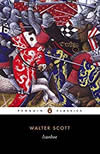 19. Ivanhoe by Sir Walter Scott (November 2003) [Book #20/305]
19. Ivanhoe by Sir Walter Scott (November 2003) [Book #20/305]
Upon finishing Treasure Island, I searched through my stack of grandfather's books and picked out another book from my list. Ivanhoe sounded interesting. I had literally no clue what it was about before diving in. Turns out, it's Robin Hood. Or at least Robin Hood lite. Reading through the book the main impression I had about the book was this guy who would steal from the rich and give to the poor. Richard the Lionheart was even in the book! It is a medieval romantic novel that takes place in the 1100's about Sir Ivanhoe after he comes back from the Third Crusades. This was definitely a surprising book for me, since I had no clue what I was getting into. Overall it was a very enjoyable book and one of the few on the list that takes place in medieval England.
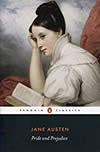 20. Pride and Prejudice by Jane Austen (July 2004) [Book #31/305]
20. Pride and Prejudice by Jane Austen (July 2004) [Book #31/305]
Also on the Sybervision, BBC, and My Book lists - During the early part of the 1800's there was a series series of books written that could generally be classified as romantic time period pieces. Many of these books were written by women who remain as popular today as the day they were written, especially Jane Austen, who is possibly the most famous of them all. The first of Austen's novels that I dove into, Pride and Prejudice, is possibly her best, if not her most famous novel. The story follows the lives of several socialites, all of varying social classes, trying to woo each other. Austen's writing style is full of whit and satire, and although it is incredibly intelligently written it still remains easy to read, a feat many authors fail at. She manages to take a variety of people, all with various attitudes and mannerisms, and involve them in a believable, yet very funny, series of verbal confrontations ranging from topics of marriage, money, and social class. This is definitely a book on my must read list and my favorite of her works.
 21. Frankenstein by Mary Shelley (2004) [Book #27/305]
21. Frankenstein by Mary Shelley (2004) [Book #27/305]
Also on the Observer list - There are many stories on this list that quickly fade from memory. Upon looking at a synopsis I can often regain what the story was about and some plot details but many are just unremarkable. Frankenstein is not one of those books. I recall this book in vivid detail, despite writing this 15 years after initially reading the book. The story is very well known by this point in our history. A doctor keeps experimenting, and eventually succeeds, in bringing someone back from the dead. Actually a lot of someones, since the monster is essentially an amalgamation of a bunch of different parts. But the story itself brings up a very unique quandary. Should humanity attempt to play God, and what happens when it occurs. It is a very short read, having read it in only two days. And the writing itself is not that great. I found the book felt "unpolished", for lack of a better word. But the concept is what keeps Frankenstein in the social conscious. Many movie adaptations lack the essential part of the book, which is that the monster is not only self aware, but a fully intelligent individual intent on discovering why he was created by his master, otherwise known as his God. The book is written as a series of journal articles, a method not commonly done back in those times, however is remarkably similar to Dracula in that way. Through this method you get inside Doctor Frankenstein's mind as he works his way through his creation. A very clever book indeed, and one that I'm sure will stick with you through time.
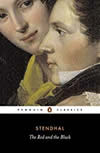 22. The Red and the Black by Stendahl (February 2017) [Book #144/305]
22. The Red and the Black by Stendahl (February 2017) [Book #144/305]
Also on the Norwegian list - Before I started reading The Red and the Black I was warned by a friend who kept saying that it really wasn't a good book. This did not get my hopes very high and I kept pushing the book off. However, since I am at the very end of the Sybervision Book List it was time to sit down and read it. The translation I read was that used in the Everyman's Library and was remarkable easy to read. That made the book rather enjoyable, at least at first, because I could jump right into the book without having to get used to the writing style. In regards to the story, I was under the impression (for some reason, I do not know) that this was a war story, similar to War and Peace or Les Miserables. Oh, how wrong I was. Apparently, this turned out to be a "romance" novel, and not one that was very well constructed. The main character, Julien Sorel, goes through two main loves in the book, which the book is divided into two main parts accordingly. Through most novels, the reader is made to feel for the protagonist, and to hope they succeed. Julien, though, was just a pain in the ass. At times he was overly arrogant, at others he was wishy-washy. He wanted one thing on one page, then would flip to the exact opposite the next. And the women he was lusting over had the same problems. The back and forths got to be so bad that I couldn't really care less what happened at any one moment, I just wished the story would progress somewhere, anywhere. I did find the hints of a fascinating story mixed in there though. There was at one point that Julien seemed to get mixed up in the politics of the time (just after the fall of Napoleon), which was the aristocracy versus the church, and he was to travel to England to deliver a message. However, that story-line was dropped so quickly that I had to go back and reread a few pages to find out what happened. That excitement is what gives me hope that the other Stendhal novel on my list, The Charterhouse of Parma, could be a great read, but I'm not holding out too much hope. Overall, the style of writing was very easy to follow and I just flew through this rather long novel, but the story itself kept having me banging my head against the wall. There is no way can I endorse this garbled mess.
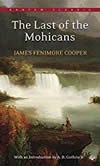 23. The Last of the Mohicans by James Fenimore Cooper (January 2017) [Book #143/305]
23. The Last of the Mohicans by James Fenimore Cooper (January 2017) [Book #143/305]
Also on My Book list - I am conflicted about how I feel about The Last of the Mohicans. In one respect, this book is beautifully written with prose that just oozes with descriptions giving the reader a wonderfully rich experience that isn't overly cumbersome to dive through. On the other hand, this book is horribly racist towards Native Americans, displaying them as "brutal savages" who don't know any better. It is possible to view this book as a product of its time. If this were written today, it wouldn't make it passed the editor's office before being rejected outright. However, at the time it was written, this is how people thought (I assume). It's not even all of the Native American's which are depicted as moralless savages, but they are all given pretty short shrift. I enjoyed the book though, once I was able to get beyond that. The story is basically divided into two parts. The first part is about a group of "white people" trying to make it to Fort William McHenry on Lake George in New York with the help of the last two Mohicans. I know this area very well, since some of my family is from there and I've been to this fort. So this part of the story was fun for me. I could picture the scenes in my head. However, the story was also rather confusing at times, especially keeping all the people straight. Cooper calls the main characters and tribes by different names frequently and alternates with just the first names or just the last names to the point that it took me about 100 pages before I was certain who was who and how many people were actually in the story. In the second part of the story, the group travels up north and I won't go into any more for the risk of spoiling it for someone who may be interested in reading it. I found the ending though very satisfactory and the author didn't pull any punches. Overall, even with the poor representation of the Native Americans, I think this was a very well written, good story. It plays more as a historical reenactment than a work of fiction, and I think that is what helped me get through the more racist elements. So I feel that I can recommend this book.
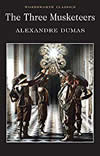 24. The Three Musketeers by Alexandre Dumas (June-July 2016) [Book #138/305]
24. The Three Musketeers by Alexandre Dumas (June-July 2016) [Book #138/305]
Also on My Book list - After having read several books on the list that were either partially or entirely a drag to read, it was a tremendous surprise to find out how much I really liked this book. The Three Musketeers is actually very easy to read and I swear, it feels as if it could have been written today. However, this is not one of those books that has a higher intellectual purpose. This is an action/adventure flick in book form. It goes from one action "scene" to the next all the way to the end. The story follows a man named D'Artanian, who, at the being of the story, was not a musketeer. Shortly he befriends three men who go by the names Athos, Porthos, and Aramis, which are the entitled Three Musketeers. The funny thing about this story though is that it really isn't about the three musketeers at all. They are supporting characters at best, and in the case of Porthos, he is even called out in the story as almost superfluous. Even with this, it doesn't detract from the story at all, and there are several instances where different character's fates were not what I was expecting at all (and if this was written today would have been completely different in my opinion). There were a couple of things that didn't work for me. The main one was the long winded section where Milady is describing her past and how she got to where she was at that point in the book. The problem is, all of that story was a lie, and the reader knew it was a lie while she was giving the story. So, it felt like a complete waste of the reader's time, which is already being taken up for a while with this around 600 page book. But besides that, I ripped through this book faster than I have read a book in a long time. This is a definite must read in my opinion.
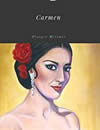 25. Carmen by Prosper Mérimée (June 2012) [Book #109/305]
25. Carmen by Prosper Mérimée (June 2012) [Book #109/305]
When I read some of these shorter, free books, on my wife's Kindle, I have a tendency to wonder if this is the actual book that is on the list. Carmen was one of these books because ittook me three days to read, so I looked up the plot synopsis on Wikipedia, and lo and behold, yes this was the book on my list. Other than being remarkably short, I rather enjoyed the story. The book is broken up into 4 chapters with chapters 1 and 2 being the background of the narrator and his meeting with the principle character, Don Jose Navarro. Chapter 3 was the main story, and the one that the opera is based on. The final chapter, chapter 4, is a very weird chapter about gypsy life and language, that does not really follow the rest of the book at all. The main story, chapter three, is narrated by Don Jose from prison telling the main narrator about his life from being a good kid to his eventual outlaw ways, all because of the gypsy Carmen. I thought the story read very well and it was actually quite enjoyable, but I don't think it stood out enough for me to be considered a 100 Greatest Book. Usually those stories are pretty memorable and I feel this one will be quickly forgotten. A nice read, but not a must read.
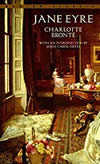 26. Jane Eyre by Charlotte Bronte (December 2003) [Book #21/305]
26. Jane Eyre by Charlotte Bronte (December 2003) [Book #21/305]
Also on the the Observer, BBC, and My Book lists - Continuing on through my grandfather's book collection I noticed there was a large number of books by Jane Austen and the Bronte sisters. And so I decided to sit down and tackle some of those books. It has been so long since I have read Jane Eyre, I feel that I can't do it justice anymore. This is another of the books I need to go back to at some point. Our title character, Jane Eyre, starts off the story at an orphanage and eventually grows up to live with the famous Mr. Rochester. I almost feel like Mr. Rochester is more of a famous character in modern day society than even Jane Eyre is herself. The book is a fun romantic novel with an air of mystery that definitely deserves another go around for me.
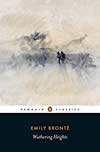 27. Wuthering Heights by Emily Bronte (May 2006) [Book #45/305]
27. Wuthering Heights by Emily Bronte (May 2006) [Book #45/305]
One of the 2 on all 4 of the 100 lists (Observer, Norwegian, BBC, and also My Book list) - Wuthering Heights ended up being a very weird book and not at all what I expected. I initially considered this to be one of those "chic lit" books but I couldn't have been more off. This is one of the most depressing books I have read yet. The book explores how Satan himself can sometimes corrupt people into being wretched human beings, but in the end sometimes they are able to pull through. Most of the story takes place as a flashback of one of the former housekeepers. It is a little confusing and not very enjoyable at first because of the erudite language Bronte used, but after a few chapters I got used to it. After the flashback it shows an orphaned child, Heathcliff, brought back to the house and is shunned by everyone. However, Heathcliff eventually takes over everything. Since most of this is known at the start of the story, it is interesting to see how everything comes about and to see how two separate families who differ in everything (intelligence, strength, and health) intermingle. This book is definitely on my must read list and it should be on yours.
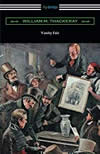 28. Vanity Fair by William Thackeray (August - October 2016) [Book #139/305]
28. Vanity Fair by William Thackeray (August - October 2016) [Book #139/305]
Also on the Observer and My Book lists - Vanity Fair had sat on my shelf for many years because I was not in the mood for more of the 18th century "romance novels". The kind of novels that were exemplified by the Bronte sisters and Jane Austen's works. They are all right to read once, but too much of that stuff wears me down. I feel there is no real "meat" in those books, just all fluff. Vanity Fair, though, is not one of those 18th century romances. In fact, it is the quintessential opposite in which Thackeray purposely makes fun of those novels. Thackeray's main characters are often vain, selfish, petulant, and immoral. Everything you wouldn't expect from an 18th romance novel. This actually made it a pleasant reading experience. I even laughed out loud at several instances throughout the book. The book is set up as written by someone who is acquainted with the main characters and is narrating their story as a storyteller would. This goes so far as to even have the narrator frequently making reference to the fact that you are reading a book that he is retelling. In terms of story, the main character, Becky Sharp, is not a hero. She is not even likable through much of the story. The only time that she may actually be likable is when you aren't sure if she is being sincere, which I am not convinced ever happens. Although she is the main character, the plot of the story works its way through two main families (the Crawleys and the Osbornes), taking it's leave of Becky when other story lines would take precedent. The plot and time moves steadily on throughout the story with characters coming and going as needed. My main problem with the book, though is that even though the writing is very well done, the story itself is rather dull at times. At over 700 pages long, it takes a long time to work through the narrative. The story could have been trimmed up pretty easily making the pace move a bit faster. I would often get bored of reading the book and need to put it down for a few days because there was nothing drawing me to read more. However, as I moved on towards the end I felt the urge to keep reading build up. Overall, I would say that the story was enjoyable, and funny at times, if not a little bit long winded, but I recommend it nonetheless.
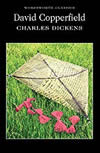 29. David Copperfield by Charles Dickens (January - March 2013) [Book #116/305]
29. David Copperfield by Charles Dickens (January - March 2013) [Book #116/305]
Also on the Observer, BBC, and My Book lists - This was one of the longer books I have read in a while and I did greatly enjoy it. I found myself wondering what was coming around every turn of the story. Although, after reading the "review" that was found at the end of my version I did notice some rather odd things about the story. Mainly, the first part of the book felt very, very different from the rest of the book. The first part was rather dark and things kept getting worse and worse for David. Once that portion was past though, the book seemed to level out and although there were some bad times, there was nothing quite like that first part. Another thing that has me confused is on the title itself. The story is named after the primary character, David, who for one doesn't go by "David" for the majority of the story. Also, the story focuses more on the supporting characters than on David himself. I felt I was watching the lives of the secondary characters pass through, rather than seeing the story change by any actions of David himself. The story itself was very well written and I was surprised that characters that seemed to be one-note characters would constantly reappear later in the story. Many of these characters did get tiresome, they eventually did redeem themselves by the end. The story itself is easy to follow and well written and I must say this was the best Dickens' story I have read. By the end of the story, I did feel that some of the character arc conclusions left a little to be desired. But overall, the story was well done and I would have to recommend people pick it up.
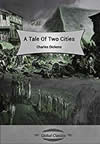 30. A Tale of Two Cities by Charles Dickens (2004) [Book #29/305]
30. A Tale of Two Cities by Charles Dickens (2004) [Book #29/305]
Also on the BBC list - "It was the best of times, it was the worst of times." This is perhaps the most memorable opening to a novel in the history of literature (except perhaps Moby Dick), but it is also a novel that seems to have faded from my memory over time. I have found Dickens himself becomes a bit drab to read. He likes to pull his punches in his stories, so in the end they don't have as much of an impact as they could otherwise have. The book itself was a rather enjoyable book though about London and Paris (the aforementioned two cities) during the time of the French and American Revolutions. It is a romance showing how far people are willing to go for the ones they love during times of crisis. The story ended up being rather confusing at times and it is definitely not Dickens' best work, but an enjoyable story nonetheless.
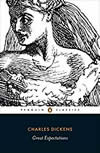 31. Great Expectations by Charles Dickens (2004) [Book #30/305]
31. Great Expectations by Charles Dickens (2004) [Book #30/305]
Also on the Norwegian, BBC, and My Book lists - Great Expectations was one of Dickens' last novels, and by far one of his best. The novel follows Pip, a street orphan, as he is saved by a convict and eventually grows up to find love. While reading through the story it can be a bit slow at times but overall the story is well written and easy to follow. This book, along with most of Dickens' other works, also suffers from the eternal optimism that is a hallmark of Dickens writing, however it flows much more easily in this story than in others where it often feels forced. The story tackles many themes including wealth versus the poverty we see Pip start out with, love and rejection, and good versus evil. It is definitely a story with a warm heart at its center, as can be found usually with Dickens.
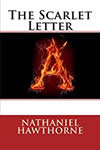 32. The Scarlet Letter by Nathaniel Hawthorne (2001) [Book #17/305]
32. The Scarlet Letter by Nathaniel Hawthorne (2001) [Book #17/305]
Also on the Observer list - This is one of those "forced to read in college" books for me. I didn't get it at the time and that makes me want to go back and see if I better understand it now. At the time I had felt that the beginning was extremely slow and that had a tendency to drive people away from the book (at least that's how I felt). However, the book does get better fairly quickly. The novel follows a woman, Hester Prynne, who committed adultery and conceived a child from the affair within Puritan society. The strict rules of this religious society forces Hester to wear a bright red "A" to announce to everyone her improprieties. The novel explores how religion plays into her life as well as the guilt and sin associated with it. This is definitely a novel I plan on revisiting someday.
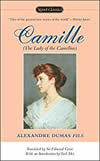 33. Camille by Alexandre Dumas (April 2012) [Book #104/305]
33. Camille by Alexandre Dumas (April 2012) [Book #104/305]
Also on the My Book list - At first, while reading this book I got the feeling I would have to dredge my way through it like I have through several on these lists. The writing was awkward in the beginning; either that or the translation was poor. Either way, I was not enjoying it. The story seemed rather random and it was kind of dull. But then something just clicked and not only did the reading get easier, the story was much better, and actually pulled me into it. I cared for the characters and was regretting what was bound to happen to them. The premise of the story is that the author comes across the estate sale of a very young (early 20’s) "kept" woman (Marguerite Gautier) (a "kept" woman is basically a high class prostitute) and purchases a book with an inscription inside it. The inscription is by a former love of the woman (Armond Duval) who had given the book to Marguerite as a gift. Days later Armond is at the author’s apartment trying to get the book back. What follows is a love story of what happened between the two people that is very touching, and possibly true. Although I figured out the "catch" towards the end, it did not in the least ruin the story for me and it was written in such a way I think anyone would have figured it out. But on the cover of one of the books it states that Henry James said this is "one of the greatest love stories of the world" and I would have to agree. It is riveting, intriguing, and heart rending, a definite recommend.
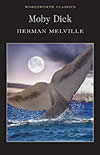 34. Moby Dick by Herman Melville (August-September 1998) [Book #9/305]
34. Moby Dick by Herman Melville (August-September 1998) [Book #9/305]
Also on the Norwegian and Observer lists - Moby Dick is often cited as the analogy for relentlessly pursuing your dreams, often to the detriment of everyone around you. My introduction to this book was not all that great, having been forced to read it in my senior year of high school and never fully appreciating it at the time. Besides the plot of the book, one of the things it is most known for is perhaps being one of the most famous introductory lines in all of literature: "Call me Ishmael." In general, the story is about a man while trying to take control of his fears ends up being destroyed in the process. The book reads slowly and the chapter describing whales escaped my understanding as to why it was even in the book (at least for my high school self). This is a not recommend by me but maybe this could improve with a rereading (although I don't see that ever happening).
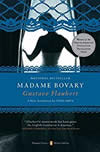 35. Madame Bovary by Gustave Flaubert (April 2010) [Book #88/305]
35. Madame Bovary by Gustave Flaubert (April 2010) [Book #88/305]
Also on the Norwegian, Zane, Observer, and My Book lists - The first thing I noticed while reading Madame Bovary was how well is flowed. One idea flowed into another, most of it without a break or pause. Seemingly unconnected thoughts were put together seamlessly in a string of narrative that I could only hope to replicate. I loved reading this book, especially after The Canterbury Tales, since the language was so much easier to follow and I'm not trying to decipher what the author is saying, I'm just enjoying the words. I did have some problems with the book though. The first being the very weak female characters, especially the main character. She seemed mostly to be reacting to events in her life and not being proactive in any of her choices. Nothing she did was really in response to what she wanted and more in response to what someone else wanted. And her child was the most useless of characters, almost inconsequential for 99% of the story. So, even though it did have some weak points, it was a marvelously written story and I would definitely recommend this as a must read.
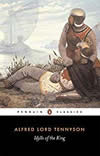 36. Idylls of the King by Alfred Lord Tennyson (March 2017) [Book #145/305]
36. Idylls of the King by Alfred Lord Tennyson (March 2017) [Book #145/305]
Idylls of the King is an epic poem written in free verse describing the time of King Arthur from when he meets Guinevere until his death and the collapse of his Round Table. This is a spiritual sequel to The Lady of the Lake, and in more than one instance I had wished I had read that story immediately before beginning this one (although reading my review of how much I didn't like it, I'm glad I didn't). At first, while reading through this poem I was greatly dismayed due to the difficulty in understanding anything that was going on. I would get lost in the poem not knowing who did what, or why, or even care who or why. I realized this had to be one of those stories where I read a summary of the events in each section before I read the section. After I started doing that, the story became much easier to follow. If I became lost at any point, I was able to pick the story thread back up fairly easily. The story is laid out in 12 chapters. Each chapter is essentially a stand alone story that occurs during the time of King Arthur, with few threads weaving through the whole narrative. The narrative builds though, and by the end it does make a bit of sense. The primary underlying theme of the stories is Lancelot's eternal love for Queen Guinevere and how eventually they become lovers, bringing the downfall of Camelot. The story itself is often sparse, being filled with the flowery language of the poem. At times the poem is exquisitely worded, however those times would come and go. One thing that stood out to me was the consistently incorrect use of the words "past" instead of "passed" and "bad" instead of "bade". I wasn't sure if it was an editorial issue or that's just how it was, but it drove me nuts. Overall, I was rather bored by the poem and just wished it would be over. Luckily, it's short and the ending came pretty quickly.
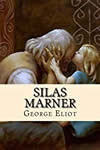 37. Silas Marner by George Eliot (May - June 2007) [Book #60/305]
37. Silas Marner by George Eliot (May - June 2007) [Book #60/305]
Silas Marner is the type of book that you might want to sit back, on a nice summer evening with, and read while relaxing. For the first half of the book I felt no pulling force that often makes you want to keep on reading once you get into the book and I just read it at my leisure. But around the halfway point I hit the draw and I finished the second half of the book in two days. This is a very sweet book about a man who got screwed early in life becoming a recluse, and then he got screwed again when he had his only reason for living stolen from him. Both of these happened within the first half of the book. The second half deals with what does a person like this do when presented with an orphaned child. The book is very well written and flows smoothly but I feel it lacks that special something to place it on the 100 greatest list. So I am not going to put it on my personal greatest books list, although I do think people should read it.
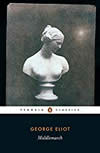 38. Middlemarch by George Eliot (January - March 2008) [Book #71/305]
38. Middlemarch by George Eliot (January - March 2008) [Book #71/305]
Also on the Norwegian, Zane, BBC, and My Book lists - I rather enjoyed Middlemarch. It started off slow, but as the book went on it picked up its pace rather well. Although the book was the longest I have yet read on this list, about 900 pages, the plot was simple enough that it was easy to follow throughout the entire book. Middlemarch is a town in England where the book follows the lives of the families living there, mainly two different families and their daughters. The book also delves into a lot of conflicts including doctors versus faith, modern medicine versus traditional medicine, and similar subjects. When I started reading the book I had a brief period where I needed to get used to the language being used but it didn't take me very long and afterwards I could easily understand what was going on. I can easily recommend this book as a great story with good lessons, if you are willing to take the time to read it.
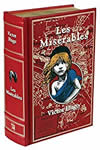 39. Les Miserables by Victor Hugo (April - May 2006) [Book #44/305]
39. Les Miserables by Victor Hugo (April - May 2006) [Book #44/305]
Also on My Book list - I grew up attending the musical version of Les Miserables and I was always thoroughly confused by the play. I enjoyed the music but the plot of the musical confounded me. After having seen the musical three or four times, I decided to delve into the book and I must say that this book was absolutely enthralling. I have since seen the musical after having read the book and it makes much, much more sense now. The story is two fold, one following the social unrest of the French Revolution following the fall of Napoleon at Waterloo, the second follows an ex-convict, Jean Valjean, while he tries to redeem his life. The book meanders a bit in its plot, but overall I found it fantastic. I was lost in the depths of Hugo's Paris and I didn't want to find my way out. Many times when an author goes on random tangents (like Melville) I get bored and want to move on with the story. This was different for me. Hugo paints such a wondrous portrait that I want to delve back into it time and time again. This is definitely on my must read list and is perhaps one of my favorite books of all time.
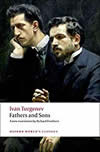 40. Fathers and Sons [AKA Fathers and Children] by Ivan Turgenev (July 2007) [Book #61/305]
40. Fathers and Sons [AKA Fathers and Children] by Ivan Turgenev (July 2007) [Book #61/305]
I have a tendency to like Russian literature a lot because, so far they have been all very easy to understand and read. This book was no exception, although it was a bit odd at times. The story is very well written and the language used is immaculate, however the plot seems to have lost meaning for me, especially around the end. It is about the interactions between a pair of friends, their families, and society as a whole. The older friend, Bazarov, is a nihilist (meaning he believes in nothing), and the younger is Arkady, his pupil. The plot evolves around how Arkady deals with his mentor's views and how his mentor comes to see those views over time himself. Meanwhile, all of this takes place during the time when the serfs were freed, causing conflicts that the main characters have to work around in order to maintain their principles. At the end of the story Arkady's plot ends where I felt it was going, but with Bazarov, I feel the author didn't know what to do with him so he just left him "high and dry". Overall, a good book, but not a "100 Greatest book of all time" book.
 41. Crime and Punishment by Fyodor M Dostoyevsky (1999) [Book #12/305]
41. Crime and Punishment by Fyodor M Dostoyevsky (1999) [Book #12/305]
Also on the Norwegian, BBC, and My Book lists - After reading Crime and Punishment, Dostoyevsky went straight to one of my favorite authors. The book follows a man who feels he can commit the "perfect murder". Unfortunately, his guilty conscious gets the better of him and after a long, agonizing reflection period he is eventually caught and punished for his crimes. The writing was excellent, and the story gave us every little nuance in the character's subconscious during the whole ordeal, from planning to regret. This book also illustrated to me that Russian actually translates very well to English, where I have rarely had difficulty in understanding a Russian-to-English translated work, and it has made Russian writers usually some of my favorites. In actuality, my only problem with the book is the epilogue, which is so out of place in the story that it is obvious it was added afterwards because the publishers were unhappy with how the original story concluded. To get the full impact of the story a reader may just want to not read that section, in my opinion. This is a definite recommend in my opinion.
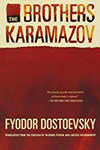 42. The Brothers Karamazov by Fyodor M Dostoyevsky (July - September 2006) [Book #52/305]
42. The Brothers Karamazov by Fyodor M Dostoyevsky (July - September 2006) [Book #52/305]
On the Norwegian and the Observer lists - After reading Crime and Punishment I became a big fan of Dostoyevsky, an I found that this book read a lot like Crime and Punishment, which is the reason why I liked it so much. I probably would put this on my personal must read list but Crime and Punishment is already on the list and I thought that Crime and Punishment was a much better book. Overall I though the book was extremely well written, but long (~800 pages) and I did not fully understand the point of the epilogue. A good translation can make or break a story and I have found over time that Russian literature has a tendency to translate very well into English. The Brothers Karamazov is about 3 (maybe 4) brothers all from the same father but different mothers. All of them have widely varied personalities ranging from borderline psychotic to deeply religious to the non-religious academic. The story culminates in a murder that we as the reader know the brother did not commit but he is put on trial for. I like the way the story was written, with us knowing more than the people in the trial and the ending for the most part made sense; again except for the epilogue. So if you are in the mood for a long but relatively uncomplicated read, I recommend this one.
 43. Little Women by Louisa May Alcott (May - December 2011) [Book #101/305]
43. Little Women by Louisa May Alcott (May - December 2011) [Book #101/305]
Also on the Observer and the BBC lists - Typically when Little Women is mentioned, it is often regarded (at least in my mind) as a little girls/ chick lit novel. I had tended to stay away from this book for that very reason and it might have worked out for the better. The way I read it was very slowly, about 10 pages or so a night, to my daughter, over most of the year. In this way I had a chance to grow with the characters as they were growing and watch my daughter grow as well. I become connected to them in a way that doesn't usually happen to me and when one of them died, I really felt the loss. This book was one of the better books I have read in a while and although it would probably still be considered a chick-lit novel, I found the characters very engaging and the writing to be far superior to many books written for the same age-level. As the characters got older, the language in the book also seemed to be getting older, to the point that at the end I didn't know what several of the words even meant, or how to pronounce them. In the end, I would recommend this book, especially as a family read-time book. I had a great time reading it to my daughter and I could feel many families would enjoy a similar experience.
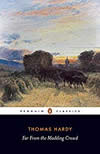 44. Far From the Madding Crowd by Thomas Hardy (September-November 2012) [Book #113/305]
44. Far From the Madding Crowd by Thomas Hardy (September-November 2012) [Book #113/305]
Also on the BBC list - I have mixed feelings about this book. On the one hand the ending was exactly as I had hoped for during the duration of the book and I felt excited that it was actually happening. I was also pleased that I wasn't sure exactly what direction the book was going for the majority of it. It kept me guessing. On the other hand I kind of get tired with books that take a strong female lead and beat her into submission for the majority of the book. The main female character, Bathsheba, was this strong, independent woman who could not stand to think of a relationship for the first half of the book. But then that one man comes into her life that spells trouble. The story revolves around the mistakes she has made in her 'love' life and how she must own up to them. The book is well written and easy to follow, so there were no problems there. At the end of the book I felt that it was a must recommend (based on that satisfactory conclusion) but for the majority of it I couldn't see this as being a good book in the modern context (I don't typically appreciate the degradation of a strong female character). So I will say that you should read it if you are aware of what you are in for and can accept that.
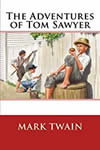 45. The Adventures of Tom Sawyer by Mark Twain (2004) [Book #28/305]
45. The Adventures of Tom Sawyer by Mark Twain (2004) [Book #28/305]
Although The Adventures of Tom Sawyer was written first and is really the first book in the pair (with The Adventures of Huckleberry Finn), I'm sure I am like most people now-a-days having read Huckleberry Finn first. Mainly because it was required for school, but also because it is just considered a better book. The two books are not so reliant on each other that you even have to read Tom Sawyer. So, having finally delved into Tom Sawyer I was really disappointed by it, especially given how much of a hallmark Huckleberry Finn is in modern American culture. The book itself is good on it's own, but in the shadow of it's more successful sequel, it definitely pales in comparison. While Twain seemed to be trying to make a political satire with Huckleberry Finn, much of that is lacking in this story, causing the book to have a much more "for kids" feel about it. The gist of the story is mainly about Tom manipulating everyone to get what he wants done, then having some minor adventures around town. The most interesting parts of the story for me though were when some aspects this story reappear in Huckleberry Finn.
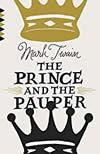 46. The Prince and the Pauper by Mark Twain (December 2013 - January 2014) [Book #120/305]
46. The Prince and the Pauper by Mark Twain (December 2013 - January 2014) [Book #120/305]
Perhaps when the story was written it was original in it's premise but I feel it may have been over used in today's society. The basic plot is that a pauper dreams of seeing the prince one day, they meet, exchange clothes and find out they are identical. So much so, that no one can tell the difference. The majority of the story then follows the prince as he tries to make his way back to the throne. I thought the story was enjoyable and short enough for a rather simple premise. However, I was disappointed by the end. I felt that the prince had built up some really great grudges by the end of the story and I couldn't wait to see what happened to those people but it was just written off with a few lines. I am also not sure what it is about Twain's writing and his "legacy" but I feel that none of his stories (at least the ones I have read) possess the wit that is supposed to be a hallmark of Mark Twain. The book was well written and fun but I was expecting something a little more clever witted/ humorous. Another problem I had with his writing was that in times when he would simulate a "historical observation" the text was rather dense and confusing to the point that I had a tendency to skim over those parts because I couldn't quite follow what was going on. On a whole, this was a nice, quick, enjoyable story but not one I would call one of Twain's best.
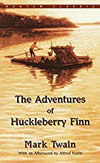 47. Adventures of Huckleberry Finn by Mark Twain (1996ish) [Book #3/305]
47. Adventures of Huckleberry Finn by Mark Twain (1996ish) [Book #3/305]
Also on the Norwegian, Zane, and the Observer lists - Huckleberry Finn is one of the many novels on this list which I had read as a result of a high school assignment. I actually had to read it a couple of times for school and I have since come to love the book. It is a rather contentious book because of the language used in the book, specifically the "N" word used so prolifically throughout, however I feel that is one of the reasons it should be read. The book forces people to look at where we were as a country, where we are now, and how far we still have to go. The main plot revolves around a childhood adventure story, where Huck runs away from home getting into all sorts of trouble along the way. He travels on his trip with escaped slave Jim, whom Huck goes from seeing just as a slave to eventually seeing him as a person and a friend. This book is a must read, if only because people try to ban it.
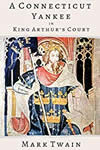 48. A Connecticut Yankee in King Arthur's Court by Mark Twain (January - June 2014) [Book #122/305]
48. A Connecticut Yankee in King Arthur's Court by Mark Twain (January - June 2014) [Book #122/305]
Also on My Book list - The previous Mark Twain book that I read, The Prince and the Pauper, was alright, but it left me wanting for the well known wit of Mark Twain. I got that wit in this book. A Connecticut Yankee in King Arthur's Court was everything that I had hoped The Prince and the Pauper would be and more. My only regret is that it took me so long to read because I had more important things going on. The story is written in the first person narrative of a man who is transported back in time to the 6th century from the 19th century. No time is spent discussing how he was transported back in time, which I assumed would eventually be resolved but it never was. Upon being transported back in time, he is almost immediately put to death. How he gets around this is pretending to be a sorcerer, even more powerful than Merlin (who is in this book and is completely incompetent). The Yankee proceeds to "improve" life back in the 6th century, trying to bring it up to "modern" 19th century standards. Twain makes almost everyone in the 6th century appear dimwitted, or even outright moronic, including King Arthur himself. This is not a trait I have seen attributed to these people of legend before and Twain was actually quite convincing in his representation of these characters. The biggest surprise was the ending, which I won't spoil, but I had assumed I knew exactly how the book was going to wind up, but as it turns out, I think I was wrong, but it was rather vague. Just like the time travel aspect at the beginning, the ending was never fully explained. One of the things that took me by surprise, though, was the strong anti-Catholic Church feeling that the story kept bringing back. He even went so far as to try and convert all of England to a Protestant nation back in the 6th century. Overall, a very thoughtful, funny, and insightful book that will happily go on my must read list.
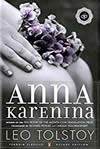 49. Anna Karenina by Leo Tolstoy (December 2008 - January 2009) [Book #80/305]
49. Anna Karenina by Leo Tolstoy (December 2008 - January 2009) [Book #80/305]
The only one on all 5 lists (Norwegian, Observer, BBC, and Zane) - Being the only book on all 5 of my Greatest Books lists, I had high hopes for it. And to start off, I thought this was one of the most well written stories I have ever read. Tolstoy just flows with descriptions that make you feel you understand everything that is going on. The characters are extremely well developed and even though they are Russian (which has a tendency to jump around with names a bit) it is still easy to follow who is who. I enjoyed several of the references to early communist culture (the book takes place about 30 years before the communist revolution) and several of the characters' personality polarities and themes that are emphasized in the book (religious vs non-religious, upper vs lower class, etc.). However, I did have some problems with the book. The story felt like two separate stories going on at the same time. The "main" one should be the one with Anna but I got the feeling that for the most part the main story was the one that centered around Levin, who supposedly represented Tolstoy himself. The Anna story itself felt enjoyable and well written, focusing around her leaving her husband for another man, of which that relationship slowly dissolves over the length of the book as well. While the story with Levin, although in parts were very good, I felt was very political and sometimes unimportant to anything. The whole last section (after the Anna story line was wrapped up) felt forced and out of place, leaving me wishing that the book would just end. All in all, I very much enjoyed the first half of the novel but the second half seemed to drag on a bit. I am not going to recommend this on my list and personally would not consider this the greatest book ever. But being that it is on so many book lists it probably should be one that you read.
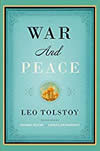 50. War and Peace by Leo Tolstoy (August 2011 - February 2012) [Book #102/305]
50. War and Peace by Leo Tolstoy (August 2011 - February 2012) [Book #102/305]
Also on the Norwegian, Zane, and the BBC lists - This is often mentioned as one of those books known just for being long, and long it is (~1600 pages) but not many people can say what the main story is about. This book follows Napoleon's invasion of Russia during the early 1800's, but most importantly during 1812. My overall impression of War and Peace, is that it feels like a typical Russian novel. In this instance the characters are a little easier to figure out than a typical Russian novel, because he doesn't use as many names for the same character as Dostoevsky often does. Even so, he does has a lot of reoccurring characters. As I think about it now, I'm not sure if all of their story lines were wrapped up by the end of the novel. You forget about some of them, then all of the sudden they return. The story is a historical fiction novel with the characters interacting with historical figures. It actually felt like a history novel because the situations played out so well. I would recommend this book to any history buff interested in the Napoleonic Wars, although I still don't understand why Napoleon was driven from Russian, even now. The book is divided into 4 books, with 2 epilogues, and an appendix. The first epilogue felt so much like the rest of the book that I'm not sure why it was made as an epilogue. It just continued the story on from the previous section. It even has chapters. But the second epilogue is what broke me. After reading this book for 7 months you give me this theoretical musing on the purpose of war and why Napoleon did what he did. It was definitely a drudge to get through and I am convinced he wrote that last section just so people would never finish this book. The second epilogue mimicked the style used for the first one or two chapters of each book but this was just orders of magnitude worse. During the actual story, he would give an overall synopsis of the war, and what Napoleon was thinking, then move right back into the story, but the second epilogue had no place in this book and you would miss nothing by skipping it. Overall, I felt the story was good but I never felt anything for the characters. When they died, I didn't really care. And that about sums up my feelings on this book. It is over and I don't really care.
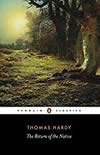 51. The Return of the Native by Thomas Hardy (June - July 2009) [Book #85/305]
51. The Return of the Native by Thomas Hardy (June - July 2009) [Book #85/305]
Thomas Hardy is able to paint a picture with his novels. When you read them you can be sure to smell the sweet fragrance of a passing flower or hear children playing on a distant hill. His ability to paint such a picture is almost unmatched. The Return of the Native flowed smoothly from the beginning picture he painted through much of the end. It was also a very easy read, once you got passed the little bit of the dated language, and I enjoyed it, for the most part. The ending however, left much to be desired. Not to spoil anything, but the deaths that were depicted were pretty pathetic. One I still don't understand if it was by accident or if it was suicide (which might have been the intent of the author). He even included a footnote to state that the ending he originally intended was changed due to critical review. His depiction of women was also pretty atrocious. I have never met such meek women in my life, and most of those I personally know would never allow to be placed in similar circumstances. Now it may be a cultural thing, but I have read many works by women of the same time period that do not portray women in similar ways, so I have to assume it is Hardy's inability to understand the female sex (not that I have any real understanding, but I do not pretend to). So all in all, an enjoyable read, but not one I would include in the 100 greatest of all time.
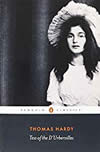 52. Tess of the D'Ubervilles by Thomas Hardy (October 2014) [Book #126/305]
52. Tess of the D'Ubervilles by Thomas Hardy (October 2014) [Book #126/305]
Also on the BBC and My Book lists - I am very conflicted with this book. First off, it is very well written and easy to read. This is a definite plus in my book. But rereading the summaries of the other Hardy books I had read so far (Far from the Madding Crowd and Return of the Native) I seemed to have similar feelings about them. All of the stories are well written but it is the story itself that I have problems with. First off, this is the best of the three Hardy books so far. But the problem is that Hardy likes to beat down the women in the book until the main character is almost not a character at all, just a plot device to drive the story forward. The story starts off with a peasant family by the name of Durbeyfield finding out they are actually descendants of the "great" house of D'Urberville. This gets them really nothing; however it propels the family forward into trying to get something from it and this is where the trouble starts. Tess is sent to another D'Urberville family thinking they are related, but in actuality they just took the name for prestige and she ends up getting pregnant out of wedlock. Her life is essentially ruined because of this but throughout the book there is a very interesting dynamic as many of the main characters are forced to face the harsh realities of Christian dogma and stigmas of the times. I found the way that the characters reacted to be rather truthful and interesting. Another problem I had was the pacing of the story, where the story would be traveling along and then suddenly something would happen. It was often jarring throughout the story where the big events often felt rather forced. But part of these jarring instances was that the author would repeatedly bring back characters and ideas hinted at earlier in the book to play more pivotal parts later on. I did rather like that approach though. Overall, I would say that the story isn't "great" but it is a pretty good read and made me think a lot, which is not always a bad thing.
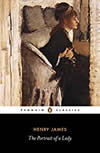 53. The Portrait of a Lady by Henry James (2005) [Book #42/305]
53. The Portrait of a Lady by Henry James (2005) [Book #42/305]
Also on the Observer list - The Portrait of a Lady, and Henry James in general, fall into my unmemorable category. Neither of the two stories that I have read of his on my lists I can recall at all. The Portrait of a Lady follows an American woman, Isabel Archer, who moved to Europe and ends up having to adapt from the free thinking American way of life to the more rigid thinking of England at the time. This follows the main theme of the novel, which is the mixing of the old and the new, with often disastrous consequences for the old way of life. Overall, the story is well written with an easy flow to it, however unremarkable it may be. I enjoyed reading at the time but after many years I cannot recall the plot off the top of my head at all.
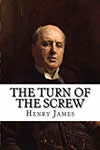 54. The Turn of the Screw by Henry James (July 2012) [Book #111/305]
54. The Turn of the Screw by Henry James (July 2012) [Book #111/305]
Looking back at a previous Henry James book I had read, The Portrait of a Lady, I mentioned that James was an easy author to read and the story simple to follow. Not so much this time. In this story, James had a tendency to write these really long, run-on sentences the entire way through the book. I thought perhaps this would change because the story started off as a narrative by the person who is writing the framing story, supposedly James. The majority of the book though, is based on a diary by a woman who the story happened to. The writing is exactly the same in both instances, with these long, drawn out sentences, all with quite a few commas in them. Here is one for instance: "The homage of which they were so lavish succeeded, in truth, for my nerves, quite as well as if I never appeared to myself, as I may say, literally to catch them at a purpose in it." This style is rather difficult to follow at times. Other than that, the book was rather interesting. It is about a woman who serves as a teacher for two students in a house which happens to be haunted by the former governess and the former handyman. The ending was rather cryptic though and the language made the entire book feel cryptic, like I wasn't entirely sure what was going on. But after reading a synopsis I think that I understood it pretty well as I was going. So, in summary, an intriguing story but a difficult one to understand.
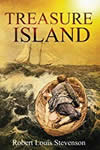 55. Treasure Island by Robert Louis Stevenson (October 2003) [Book #19/305]
55. Treasure Island by Robert Louis Stevenson (October 2003) [Book #19/305]
Also on the BBC list - Upon graduating college, I was determined to better myself, and one of the ways I planned on doing that was by reading the 100 Greatest Books of all time. Treasure Island was my first official foray into reading all of those. Most of the book I read first were books that I incidentally had obtained from my grandfathers' collections but eventually I was able to afford some more books on my own. But this was my first real book on the list that didn't have anything to do with a class assignment. The one reason I picked this first was that it was fairly short. I needed to go on a plane flight and picked this book to take with me. The story was a fast paced, "swash-buckling adventure" stories about pirates and the seven seas. It didn't even last the whole round trip to read. I was done with it in a few hours but it was a lot of fun. The book was written as a bedtime story for the authors children. He would write a chapter at a time and read them to the kids. This allowed for the story to grow on its own and maintain a fairly quick pace throughout. The time that I had read the story was around the time I had seen the movie Treasure Planet as well, which followed this story fairly closely (with some obvious changes). Overall, this is a quick, fun read that I definitely recommend.
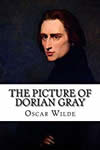 56. The Picture of Dorian Gray by Oscar Wilde (July 2009) [Book #86/305]
56. The Picture of Dorian Gray by Oscar Wilde (July 2009) [Book #86/305]
Also on the Observer and My Book lists - The Picture of Dorian Gray is a rather enjoyable book about a man who (unintentionally) sells his soul so that he may remain the Adonis that he is forever. Dorian Gray starts out pretty naive until he is told by a painter that he is the most beautiful person he has ever seen. After the portrait that he paints is complete, Dorian sees it and realizes that the painter is correct. At the same time he meets another man, Lord Henry, who says that it is a pity that he will lose his beauty at such a young age, prompting Dorian to sell his soul to maintain his current appearance.. Since that time Lord Henry had steadily corrupted Dorian, acting as a Satan character, leading him down a dark path. Fantastic book. The ending is perfect and unexpected. I recommend it to anyone interested in a fairly short, enjoyable read. Wilde does go off on some tangents at times and some of Lord Henry's speeches are difficult to follow, but enjoyable nonetheless.
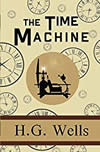 57. The Time Machine by H.G. Wells (September 2005) [Book #40/305]
57. The Time Machine by H.G. Wells (September 2005) [Book #40/305]
Similar to Frankenstein and Dracula, The Time Machine represents one of the world's earliest cases of science-fiction. Starting in a time when Jules Verne and other H.G. Wells classics were pushing the bounds of conventional fiction, The Time Machine shows us what Wells' view of the future might look like as his time traveler takes a machine into the future. The book is a very short and fast-paced, action story that is perfectly geared towards the geek in me. Fairly recently, from when the book was publish, Charles Darwin's theory of evolution was introduced and this book incorporates the (then) modern day thinking on the Theory of Evolution. This shows that Wells was on the very cutting edge of society, taking new ideas and incorporating them into an already cutting edge story. Overall, this is a great book. The plot starts off fairly slow, but as it picks up, the story draws you in quite quickly. Wells does an amazing job of taking his modern day society and projecting what might happen with the human race several hundred thousand years in the future. He then proceeds beyond this to the end of the planet Earth all together. It is definitely a visionary work for its time and a must read.
 58. Dracula by Bram Stoker (2005) [Book #38/305]
58. Dracula by Bram Stoker (2005) [Book #38/305]
Like Frankenstein, which I had read prior to this novel, this novel brings the horror genre back to the beginning. This is essentially the one that started it all. I assumed I was familiar with the plot, having seen snippets of takes on the character for decades. However, I don't think I've ever seen a straight out adaptation of the book. Reading the original novel, though gave me perspective on how the character of Dracula has changed through time, from his very first incarnation, through the many movies, novels, and TV series that vampires have been inserted into. The story is written as a series of letters and journal entries, very much like Frankenstein, however these are all from several different characters that interact with the vampire. Due to this method of storytelling, the story ends up not being very fluid at times, but it is still enjoyable nonetheless. I would have to say that it is a definite recommend for those who want to read the original.
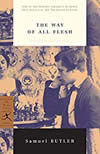 59. The Way of All Flesh by Samuel Butler (July - August, 2014) [Book #123/305]
59. The Way of All Flesh by Samuel Butler (July - August, 2014) [Book #123/305]
When I first started reading The Way of All Flesh, I wasn't sure what I was getting myself into. I read one chapter, then two days later I started reading the second chapter and realized that I had absolutely no clue what happened in the first chapter. So I reread it. After the second chapter, I had another two day break and the same thing happened again. It wasn't that the story was difficult to read or hard to understand, it was just utterly forgettable. After the first 50 pages though, the story got much better. I realized that the reason I kept forgetting what was happening was because each chapter jumped in time, but only a little. It wasn't noticeable until you realized that the previous chapter did not follow the next one directly. A little confusing, but like I said, it got better as the story became more linear. The story follows the life of a man, Ernest Pontifex, as he is raised, then becomes ordained, and eventually finds life outside of the church. However, the first 100 pages or so are focused on Ernest's ancestors as told by a family friend and godfather to Ernest. I was surprised at how anti-Christianity the story was. Ernest's parents were proper Christian folk, with his father being an ordained minister. However, they were lying, deceitful, cruel, and always blameless in their own eyes. In essence, horrible parents. Later in the story, as Ernest becomes ordained, he eventually falls out of the church by studying various aspects of the Bible and finding them unbelievable. By the end, he is writing books all about how wrong Christianity is. I had not expected that when I went into the book but actually found the anti-church motif rather interesting. The writer's portrayal of women though was a little less desirable. There were three women in the story, the horrible mother, the alcoholic wife, and the obnoxious sister. Not a good one among the bunch. Overall, the writing of the book is OK, not great. Some of the sentences are difficult to read and I had to reread several of them just because they were awkwardly phrased. But in the end I would say that the book was OK, not great but not horrible either. I just felt "meh" when I finished it. Not much of an endorsement, I know.
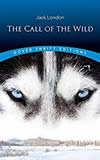 60. The Call of the Wild by Jack London (September 2005) [Book #41/305]
60. The Call of the Wild by Jack London (September 2005) [Book #41/305]
Also on the Observer and My Book lists - When you think about one of Jack London's Alaskan dog books, you would likely think about White Fang, I assume due to the popularity of the movie a few years ago. However, before White Fang was published, London published the much shorter The Call of the Wild. To start off I must say that this book was fantastic and I highly recommend it to anyone, especially dog lovers. It is gripping and intense, so much so that it makes you want to read more. And to top it all off, its short, only about 80 pages. I was able to read it in about 2 days without trying very hard. It is about a dog, Buck, who was kidnapped from California and taken to Alaska to be a sled dog. The book is entirely through the dogs perspective but it does not have any of the cheesy "dog voices". Not once do you hear what they are saying but you get how he is feeling, especially among his interactions with other dogs and humans. Again I highly recommend, you won't be disappointed.
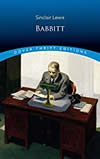 61. Babbitt by Sinclair Lewis (November - December 2016) [Book #141/305]
61. Babbitt by Sinclair Lewis (November - December 2016) [Book #141/305]
Babbitt is a rather interesting book. It takes place during the prohibition era of the early 1920's in middle America. It is set in the town of Zenith in a state that does not exist, but the main character, George F. Babbitt, frequently travels outside of Zenith to actual places like Chicago and Maine.The story is about an upper middle-class conservative businessman, who seemed unhappy with his life. Around the midpoint of the story, there is a breaking point that sends Babbitt off the deep end into a midlife crisis. During his midlife crisis, Babbitt eventually finds "liberalism" and "fun" (i.e. drinking and carousing) and it seems like he supports those wanting to make a difference in society (the worker unions) but eventually he is brought back into the conservative/religious/anti-union fold. Although the story seemed to be rather plodding at times, it had an interesting subtext. I got the feeling that the author, Lewis, was promoting liberal thoughts and anti-religion, however in the book, conservatism and religion "won". Religion even seemed to be a joke to everyone involved at the end, which was something you just had to do whether you wanted to or not. It was weird. Overall the story was well written but the majority of the story was just dull. It was an alright book, but not one I would go out of my way to point out to someone to read.
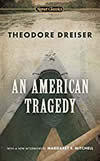 62. An American Tragedy by Theodore Dreiser (1999-2000) [Book #13/305]
62. An American Tragedy by Theodore Dreiser (1999-2000) [Book #13/305]
An American Tragedy is a fictionalized attempt to portray the real life of a hometown boy convicted of killing his girlfriend. The author was intrigued by this seemingly naive and innocent young man who went down a very dark path and why he did it. So he interviewed the boy in prison to get the first hand tale of the boy's life and turned it into this rather lengthy, but fantastically written account. It took me a long time to read the book. It was an assignment during my senior year of high school, but I never ended up actually finishing the book until the end of my first year of college. I kept at it though because it intrigued me, even then. I had to know what happened, and that was before I even started reading these books for my list. I would say that if you are up for a lengthy read, it is a good tale about how an All-American youth could be brought down to the deepest depths of despair.
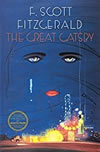 63. The Great Gatsby by F. Scott Fitzgerald (1996?) [Book #4/305]
63. The Great Gatsby by F. Scott Fitzgerald (1996?) [Book #4/305]
Also on the Observer, Zane, and BBC lists - Along with a host of other significant stories of the early 1900's, The Great Gatsby finds itself as another mandatory school read. And like many of those books, this is one I need to go back to some day to truly understand the details that I likely missed as a high school student. The book follows the life of a man in the 1920's, who created his fortune (a member of the nouveau riche) while living around people who inherited theirs. These separate worlds clash during the Roaring 20's when people accustomed to "the old ways" must learn to adapt to the new ways that are up and coming. However, Gatsby's excesses may be a bit more than even the most liberal of people could withstand (at the time). A novel about religion, poverty to wealthy, love, and a whole host of other themes interwoven into the fabric of the quintessential 1920's American story.
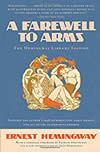 64. A Farewell to Arms by Ernest Hemingway (2000) [Book #16/305]
64. A Farewell to Arms by Ernest Hemingway (2000) [Book #16/305]
For Whom the Bell Tolls got me really interested in Hemingway and since I had several of Hemingway's books from my grandfather's collection I decided to move on to the next one, A Farewell to Arms. This one did not strike me as strongly as the first book and to be honest, I barely recall the plot after all these years. As is Hemingway's frequent MO, the story takes place during World War I, however this time we are on the Italian front. Our main character is Frederic Henry, an American ambulance driver who falls in love with an English nurse. As the war evolves, so does their love. This novel is a more "romantic" take on war but still continues the tragedy that is ever present and how war eventually takes everything from everyone. It is definitely a good novel but also a sad novel.
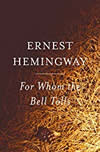 65. For Whom the Bell Tolls by Ernest Hemingway (1997-2000 Large gap in reading times) [Book #15/305]
65. For Whom the Bell Tolls by Ernest Hemingway (1997-2000 Large gap in reading times) [Book #15/305]
Also on My Book list - I started reading For Whom the Bell Tolls the summer before 11th grade for a class where we had to pick our own book to read over the summer. Unfortunately, I never actually finished the book for class. Fast forward three years and I was sick with mono during the end of my freshman year of undergrad and I clearly had nothing else to do so I picked the book up again and finally finished it. For Whom the Bell Tolls made me a Hemingway fan for life. I don't recall the reason I initially picked it up but I had loved it ever since. It is one of those books I need to go back to and rediscover, it had left such an impression on me as a kid/adult. The story follows an American soldier in the Spanish Civil War. Within the narrative there are the four main characters, all with their own opposing viewpoints on war and morality, and they question whether this, or any, war is really worth fighting. The ending has stuck with me to this day and I can picture the events within my head. It has a very Soprano's ending, for anyone who was a fan of that show. This story is definitely on my list of best books.
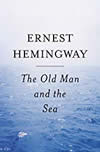 66. The Old Man and the Sea by Ernest Hemingway (1994?) [Book #2/305]
66. The Old Man and the Sea by Ernest Hemingway (1994?) [Book #2/305]
Also on the Norwegian list - The Old Man and the Sea is what I would consider Hemingway's Moby Dick story. It is a classic about the determination of an old Cuban fisherman fighting against a fish that would not give up. The shortest of Hemingway's works on this list and a great one too. A story about perseverance, old age, and how sometimes, no matter how hard you try, the results could still be considered a success even if they were not what you would have settled for at the beginning. I will have to add it to my must reread list as well.
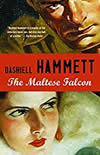 67. The Maltese Falcon by Dashiell Hammett (May, 2010) [Book #89/305]
67. The Maltese Falcon by Dashiell Hammett (May, 2010) [Book #89/305]
Also on My Book list - I know that the movie was based off of the book but it had been so long ago since I saw the movie that I don't remember any of the plot points. This was good because it didn't end up ruining any of the book for me. The movie, and a lot of similar rip-off movies, have the same motif, they contain this old detective feel; a black and white movie with the main detective doing a voice-over for much of the movie. That was exactly how this book read. It was like Humphrey Bogart was reading the book aloud to me in my head. I really enjoyed it though. It was different from most of the other books I have read and it was a constant page turner where you must know what was going to happen next. The story was not too complicated, your basic murder mystery plot, a who done it and why sort of ordeal. Overall, it was a quick and easy read and I feel that everyone should read this if they are in the mood for an good old time detective story.
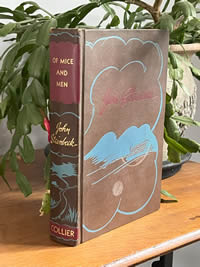 68. Of Mice and Men by John Steinbeck (1994 and 2025) [Book #1/305]
68. Of Mice and Men by John Steinbeck (1994 and 2025) [Book #1/305]
Also on the BBC and My Book lists - While I had read this book in high school and I consider this the first book I have read on my list, I have since gone back and reread it. And my, what a depressing story this is. It has a very strong Great Depression vibe to it as well, although the Great Depression is never mentioned in the story. The plot follows two companions, one of which would be considered to have a learning disability today, Lennie, while the other individual, George, is the one that takes care of him and tries to make sure he doesn't get into trouble. Which doesn't always work out the way that he hopes. While the story is very short and follows only one instance of them as traveling farm hands to a new farm, the story itself delves into racism, ableism at the time, and in some instances men's mental health. It is a profound reading experience coming at it from a 21st century mind frame. I don't think I got anywhere near all those details in high school and this is one I was happy to travel back to. A must read in my opinion.
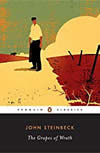 69. The Grapes of Wrath by John Steinbeck (August 2015) [Book #130/305]
69. The Grapes of Wrath by John Steinbeck (August 2015) [Book #130/305]
Also on the BBC and My Book lists - Often, when I start out reading a book, I set goals for myself, such as 10 pages a day, or a chapter a day. The purpose for this is to keep me on pace and finish in a reasonable amount of time. I had done that with The Grapes of Wrath as well, setting my pace at 20 pages per day. One of the first things I noticed about the book, though was how easy it was to read. Twenty pages would fly by and I would keep on going, partially due to the ease of reading the story but also because I had become enraptured with the characters and the story. My page goal almost became a moot point, with the story drawing me along. The story is about a family from Oklahoma during the 1930's dust bowl, who believe they will find better fortune in California after being run off their land due to unpayable debts. And that is it. The family moves around during the Great Depression trying to find work and dealing with the situations that are happening all around them. This story became a cultural and political wake up call to the US government about how bad conditions had become in the country. I don't believe Steinbeck set out to write a social commentary, mostly because the worst of the things that happened to many of the migrants happened only to the auxiliary characters, or were isolated to portions of the text not following the main plot. In many instances the main characters thrived in situations where a normal person would have been dealt a bad blow. They managed to get into camps that just happened to have an opening, or find ideal jobs when others are getting half the pay they get. I felt that Steinbeck played it safe with his primary characters in instances where today an author might not. It was the ending that really got to me though. Reading through this whole novel, I started to wonder where it was going. I felt that the characters could go on in this fashion for a long time, but clearly the novel is drawing to a close. It is when I hit the final two pages that I realized where Steinbeck was going. The ending provides the quintessential essence that the new generation must support the old, because they have become unable to do it themselves. The layout of the story was interesting, with every other chapter focusing on the main characters and the other chapters giving a parallel story not focused on the main characters, but written as a commentary on the social problems of the time. Overall, I felt the writing was fantastic, which produced a smooth read through of a fantastically well-written story. A high recommend.
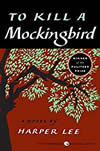 70. To Kill a Mockingbird by Harper Lee (October - November 2015) [Book #132/305]
70. To Kill a Mockingbird by Harper Lee (October - November 2015) [Book #132/305]
Also on the Observer, BBC, and My Book lists - Typically, when I am reading one of the books on this list, I am usually thinking of what I am going to say as a review, at least during the last quarter of the book. However, for To Kill a Mockingbird, I had to wait a couple of days until after I finished the book. I had burned through it so quickly, and I'm still having a hard time putting together my thoughts. The book follows the life of a young girl, Scout Finch, living during the depression in a small town in Alabama. As is true with most children, she is inquisitive and playful and the book follows her through her games and exploration of the world around her. She has a mysterious neighbor, who the children are bent on tormenting, even though they have never seen him. An interesting story point that does come to fruition by the end of the story. The main point of the book however is regarded as background material throughout the first portion of the book. This story element, like many in the book, slowly reveals itself through the natural course of storytelling. Scout's father, Atticus, is a lawyer and is charged with defending an African American man accused of raping another man's daughter. How the story manifests itself through the eyes of Scout is truly remarkable. Several times throughout the book I felt myself well up at the sheer impact of the story. I'm not sure if it is because I am father of a young girl and I can place myself in Atticus's shoes at times, or not. But this is truly an emotional novel about race relations during the Great Depression, and how far we had to go at the time. The writing couldn't have been easier to follow, and the descriptions were truly outstanding. Harper Lee's descriptions would often flow through the story, not being placed at any particular point, but would appear as natural eddies in the narrative.This resulted in me flying through the novel, reading half of it in one day. This novel has easily ascended to become one of my favorite books of all time, well within my Top 5 favorites.
Science and Civilization
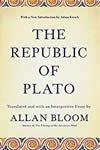 71. The Republic by Plato (2007) [Book #56/305]
71. The Republic by Plato (2007) [Book #56/305]
Of all of the books on my lists, the "Science and Civilization" section of the Sybervision book list is the hardest to get through. That is for multiple reasons but mostly because the texts are often dry and uninteresting. Although, they do have bright spots here and there if you know where to look. I had started and read most of The Republic within my undergraduate Humanities class in college, which helps greatly in the understanding of these historical works. While a historically important work of literature that delves into topics such as justice and different forms of government, this is not meant to be read as entertainment. However, I am not reading this list for a history lesson and I found the text to be extremely difficult to comprehend, even with the aid of a professor. So I would have to say this is a strong not recommended for anyone reading these stories for fun. Overall, the reason for reading this is more for educational purposes than relaxation. Proceed at your own risk.
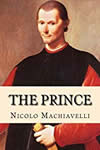 72. The Prince by Machiavelli (March 2007) [Book #58/305]
72. The Prince by Machiavelli (March 2007) [Book #58/305]
All my life I have heard about Machiavelli and how Machiavelli portrays the "winning at any cost" type scenario. This mindset all comes back to this book, The Prince. However, that is not what I got after reading it. The book is very short, especially in comparison to the other Science and Civilization books on the list, but I also found that I got very little value out of it. The best thing I could see the book used for was as a companion book on how to rule properly. Overall, I felt the language used made the book difficult to read but at least the contemporary illusions were well explained so the book was not difficult to understand. This is definitely not in my top list of books to read, nor anywhere near it.
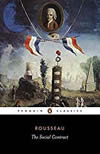 73. The Social Contract by Jean Jacques Rousseau (December 2007) [Book #69/305]
73. The Social Contract by Jean Jacques Rousseau (December 2007) [Book #69/305]
This is definitely not the best book I have ever read, however it was interesting nonetheless. The Social Contract was similar to the other political commentary books on the list as I'm sure most of them do not differ much in tone, but it was written around the formation of the US Constitution and it is enlightening to see how this book influenced the formation of my country. Although interesting, I would not recommend this book since it is rather dry but it does bring up some rather good points. The main few I noticed were that according to Rousseau, the US is a representative aristocracy not a democracy. Because Rousseau, along with other political philosophers of the time, thought a large country would not be stable as a democracy so it could never work. The second is that The Social Contract showed the citizens of Europe that kings were not appointed by divine right but are only in power because the people let them be. This is partially what led to the civil unrest around the same time in many European countries. It you are interested in political theory, then this book is for you, otherwise I would not bother.
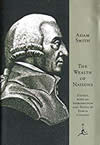 74. The Wealth of Nations by Adam Smith (May-July 2013) [Book #118/305]
74. The Wealth of Nations by Adam Smith (May-July 2013) [Book #118/305]
I think the best response for this book is what I had said about it when I started reading. I asked if it was possible for a book to be so very interesting yet so very boring at the same time. Now after finishing all 620 pages of it, I am reaffirmed of that opinion. The book is very long, longer than the 620 pages should have felt. And it was a drudge to get through. Many times he would talk about the price of one thing or another and how it has changed. This all being in British units, but the antiquated British units are no longer used, so I had a tendency to gloss over those parts. When it got interesting, I found myself invested in the narrative, more like a history textbook than a literary novel. What was really interesting was that this book seemed to be written over several years during the American Revolution. It was really amazing to watch how different America's impact on this book was depending on the date at which he was writing each section, from before the war until well into it. In the end though, the book felt more like a textbook or a scientific article than a story, which is fine, but he repeated himself so often that I feel this book could have been half the length and gotten across the same amount of material. I have heard that this is required reading for many in business school and I feel sorry for you. It may be a cornerstone of our economic system but it is tiresome to read through. This is very similar to how I felt The Origin of Species is to paleontologists, an important, long, slowly paced, bore.
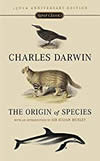 75. The Origin of Species by Charles Darwin (August - October 2007) [Book #63/305]
75. The Origin of Species by Charles Darwin (August - October 2007) [Book #63/305]
I should preface this review with the fact that I am a paleontologist and I have been studying geology and paleontology for over 20 years. I came into reading The Origin of Species knowing full well that the text was written over 150 years ago and the science of paleontology and evolution has progressed at a lightening pace since then. That being said, I still was not sure what I was getting into when I read it. To quote my former evolutionary biology teacher "Don't read The Origin of Species unless you have to." This is a science textbook and that is how it reads. The science itself is severely out of date and the text is rather dull to boot. Since the science is not current, I recommend that someone reading this should have a basic scientific background so that they can understand where the science is questionable or not. The main problem I have with The Origin of Species is that instead of doing science experiments, Darwin typically takes observations and makes large leaps of logic to explain why his observations are the way they are. Granted this is a seminal and often interesting work of scientific history, but it is too much of a difficult read for me to recommend it.
76. Das Kapital by Karl Marx
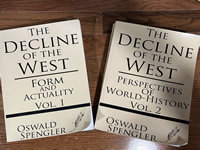 77. The Decline of the West by Oswald Spengler (November 2024-February 2025) [Book #184/305]
77. The Decline of the West by Oswald Spengler (November 2024-February 2025) [Book #184/305]
Spoiler warning: I hated everything about this book. Reading this book has been several years in the waiting. It is one of the last two books I had on the original 100 Greatest Books list I started, the Sybervision Book List (a list from a now defunct company). The book was an attempt at cataloguing the progression of history up to the 1920's when the book was written from a rather Euro-centric point of view, specifically a German point of view. However my problems with this book are almost immediate. I don't know if it was the particular translation, which also was atrocious, or the original text, however I feel it was a mixture of both. This translation, which seems to be the one most commonly around, was by Charles Francis Atkinson also from the 1920's. The text is almost incomprehensible at times. The ideas the author was trying to get across got lost more often than they were found and frequently the author (I assume it was the author) would leave words in their original Greek or other language, of which the reader couldn't even begin to decipher. My favorite parts though (sarcasm) were when the translator felt the need to constantly add his two cents in to the text. Like, shut up, this isn't your book. The topics are also widely all over the place. He jumps around the timeline across centuries within sentences of each other and fails to use the "BC" or "AD" identifier on times more often than not. And a lot of his concepts are downright just wrong. He has an entire chapter about how Darwin was just wrong and although he doesn't mention his alternative, it seems he is in favor of Lamarck but his reasoning is inconsistent. The book reads much like this was a literary essay or textbook where the author was just given access to a series of Encyclopedias, to the point that on nearly every page the translator cites an encyclopedia entry. It's dull, difficult to follow, and at many times it is just inaccurate. However, there were some light points. I did find some of his information intriguing, when I could decipher the text. I appreciated the agnostic approach to religion within the text. And he appeared to have some insight into the evolution of Germany at the time, which he was opposed to. His overall point was the Europe at this time was the pinnacle of society, however it had become stagnated since the Middle Ages in many cases and was slowly going to be overun by Asian society and ideals. So overall, it was terrible. I honestly don't understand how anyone could praise this work, although an abridged version might be much easier to follow and if one only sticks to Volume 1. Then maybe?
Plays
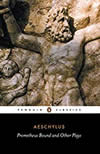 78. Prometheus Bound by Aeschylus (December 2007) [Book #67/305]
78. Prometheus Bound by Aeschylus (December 2007) [Book #67/305]
This is one of the earliest writings that are on any of the 100 Greatest Books lists. The story is about the gods, which is typical of the Greek and Roman literature at the time. More particularly, Prometheus, the Titan who brought fire to mankind. The play takes place at the start of Zeus' punishment to Prometheus for bringing the fire, where Zeus had Hephaestus chain Prometheus to a rock to be roasted alive everyday. The play is very short, it took me only about 45 minutes to read. However, I could not find any strong "moral lesson" in it, so my assumption is that this is an entertainment piece. At first I thought the play was about Prometheus' vanity and pride and that was why he was being punished, but the more the play went on the more it seemed to be anti-Zeus with his pride. Zeus' pride is shown when Prometheus reveals that he knows the possible downfall of Zeus and he is the only one who can stop it. Zeus then proceeds to torture Prometheus more until he reveals that information. Maybe this is a piece about pride? I am not really sure. Overall, the play is enjoyable but I feel it is not strong enough to be on my list.
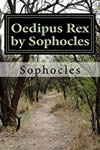 79.Oedipus Rex by Sophocles (May 2000) [Book #14/305]
79.Oedipus Rex by Sophocles (May 2000) [Book #14/305]
Also on the Norwegian list - Oedipus Rex is one of those plays that sticks with you for long after you read it. Even though it has been a very long time since I read it in my humanities class in undergrad I still recall the play vividly and how it made me feel. The story is the ultimate classic, about a man who murders his father and marries his mother. The purpose of the play is about fate and how the more you try to avoid fate the more you are going to cause fate to happen. How does knowing the future help us or how could it cause the future to happen? The most tragic thing about the whole story was it wasn't all Oedipus' fault. It started with his parents and their "curse" was carried down to him, and really was about him in the first place, but they got the proverbial ball rolling. This is a story-line that has been rehashed over and over again throughout our literary history and here is one of the first, and one of the best, to use it. I found the play very easy to understand and enjoyable. There are also two plays that continue the story, Oedipus at Colonus and Antigone, although those are not as well known as this one.
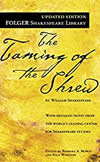 80. The Taming of the Shrew by William Shakespeare (January 2004) [Book #22/305]
80. The Taming of the Shrew by William Shakespeare (January 2004) [Book #22/305]
A new year meant that I was off to the races to try and get as many books read as I could. Often this means reading the most accessible (meaning books I already have) and shortest books I can find on the list. In this instance it meant catching up on the Shakespearean plays on the lists because there is a ton of them. Personally, I am not a particular fan of Shakespeare. Actually, I generally don't like books written in "old English" or anything just off modern English, including Shakespeare or something like Beowulf. So I knew was in for a personal chore, a short one at least, but a chore nonetheless, in getting these read. One of the first stories I tackled was The Taming of the Shrew. This story has been redone quite a few times in modern storytelling. The one that comes right up in my mind is 10 Things I Hate About You, which I actually really enjoyed. The play on the other hand is not one of my favorites. The point of the story is a guy teaches a girl how not to be a "shrew", in a rather humorous way. It is probably the best of the comedies, but no where close to the best of Shakespeare's plays.
 81. Hamlet by William Shakespeare (February 1998) [Book #8/305]
81. Hamlet by William Shakespeare (February 1998) [Book #8/305]
Also on the Norwegian and Zane lists - Hamlet is often considered to be Shakespeare's best play, and this is a rating I can get behind. The tale is about a man trying to find the murderer of his father, while dealing with the slowly ensuing madness of most of the characters around him. Unlike Macbeth, I found Hamlet to be intriguing and quotable. Several of the scenes are memorable, even now, many years after having last read/seen the play. If I had to point people to only one Shakespeare's play to read or watch, this would be the one.
 82. Othello by William Shakespeare (2004) [Book #23/305]
82. Othello by William Shakespeare (2004) [Book #23/305]
Also on the Norwegian list - Continuing on through my "quick reads", I decided to read another Shakespearean play, this time Othello. Again, Shakespeare is not my favorite, and this play is no exception. I feel it is mostly because I don't appreciate the language that Shakespeare uses in his plays. For me it is hard to read. I know what you'll say though, "but you should see it live". For me though, as someone who is hard of hearing, even seeing the plays live I am often left confused and wanting because I can't understand what the actors are saying. So most of Shakespeare's plays leave me with a less than ideal taste in my mouth. Othello is a play about love, interracial romance (a certainly taboo subject at the time), racism, jealousy, and eventually, death. The play deals with some heavy topics and so I can see its continued use in modern day society helping people to discuss difficult topics, especially in schools, but the play isn't for me.
 83. Macbeth by William Shakespeare (1997) [Book #7/305]
83. Macbeth by William Shakespeare (1997) [Book #7/305]
Shakespeare has never really been my thing and this is only the first of several Shakespeare plays that can be found on the list. Macbeth is the story of a man who commits murder in order to become king. However classic the story may be, it just didn't grab me. This is one of the weaker of Shakespeare's famous plays and one that I probably won't be going back to, unlike Hamlet or Romeo and Juliet. In general though, the language is what holds me back. I just can't get immersed in the world like I want to. I would prefer to see this play, and most of the other plays, actually acted out. Unfortunately I do need to read them for me to feel I can cross them off the list.
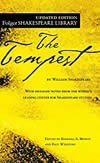 84. The Tempest by William Shakespeare (2004) [Book #24/305]
84. The Tempest by William Shakespeare (2004) [Book #24/305]
While I usually do not like the writing style of Shakespeare, and I generally don't like reading plays in general, there are some plays that I do enjoy. The Tempest is perhaps one of, if not the, weirdest of the Shakespearean plays. The premise of the play deals with a mystical island with witches and spells. And although many of Shakespeare's play do have a bit of magic in it, such as Macbeth, I feel The Tempest strives the furthest into science fiction/fantasy of all of his plays. And that may be the reason that I enjoyed it so much. The story may be a bit abstract but this ranks within my top three favorite Shakespearean plays. It is rather easy to read for me and straight forward to follow plot wise making it one of his most accessible plays in my opinion.
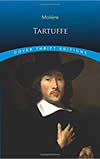 85. Tartuffe by Moliere (December 2007) [Book #66/305]
85. Tartuffe by Moliere (December 2007) [Book #66/305]
Also on My Book list - In their essence, plays are written to be performed and not read, so I don't often enjoy reading plays because I don't get the full experience out of them. But even with that caveat, I thoroughly enjoyed Tartuffe, enough so to put it on my personal favorites list. The play only took me about 2 hours to finish and it was very easy to follow along with. The plot is about a rich family where the father takes in a beggar, Tartuffe, and the father dotes on Tartuffe as a beloved son to the exclusion of his whole family. He even pledges Tartuffe to his daughter who is already engaged to another man. Overall, the play is very witty and invokes a pretty good moral lesson and best of all, everything works out in the end.
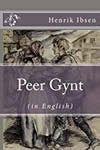 86. Peer Gynt by Henrik Ibsen (March 2009) [Book #81/305]
86. Peer Gynt by Henrik Ibsen (March 2009) [Book #81/305]
Peer Gynt is a play about a boy/man who started out running away from his troubles and inventing imaginary worlds from which to escape into. Although this was not the greatest of plays I have ever read, nor would I even include it on this list, I did not feel it was terrible at least. The moral of the story took a little bit of time to manifest itself but it eventually came. The pacing of the story was also all over the place. At times the story felt rushed, while at other points it dragged on. All if this could be attributed to the translation I read. I noticed that the translator tried too hard to modernize the story, making the text feel severely out of place at times. Overall, I would say that it was not bad but definitely not great.
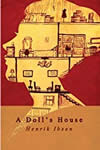 87. A Doll's House by Henrik Ibsen (June 2006) [Book #47/305]
87. A Doll's House by Henrik Ibsen (June 2006) [Book #47/305]
Also on the Norwegian list - A Doll's House is interesting because it is basically about the women's liberation movement long before there was ever a movement. The play is about a woman who has done nothing with her life except try to please two men, her father and her husband. However, it is when something tragic happens that she realizes that nothing is as perfect as it seems. The characters were written well and believable, and the story is very easy to read. Personally, I often have some issues reading plays because I feel I miss out on many of the hidden themes. Plays are often a lot denser with material because the "fluff" gets excised that you could potentially have in a novel, so anything left in the play is usually very important for the feel of the play or the plot. However, with A Doll's House I feel like I caught most of the subtle themes throughout the story and it was, like most plays, a very fast read. Definitely on my recommend list.
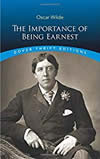 88. The Importance of Being Earnest by Oscar Wilde (July 2008) [Book #74/305]
88. The Importance of Being Earnest by Oscar Wilde (July 2008) [Book #74/305]
Also on My Book list - While reading through all of these 100 Greatest Books, there are many which are quick reads and the one consistent thing among the plays is that they are all very fast to get through. You get the introduction, the conflict, and the resolution all within about two hours. The Importance of Being Earnest was even one of the shorter ones, always a highlight for me, and I found it rather funny and enjoyable to boot. The story is about a made-up person named Earnest and two men who pretend to be him. Both of these men end up getting engaged to different women and as you can imagine, hilarity ensues (I had to say that). The play has a very fast paced narrative and the situations are not altogether unbelievable. I rather enjoyed it and will place it on my recommended reading list.
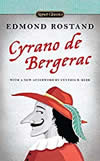 89. Cyrano de Bergerac by Edmond Rostand (March-April 2008) [Book #72/305]
89. Cyrano de Bergerac by Edmond Rostand (March-April 2008) [Book #72/305]
Also on My Book list - My wife found a website that sends a portion of a story each day in your email (DailyLit). I thought that I might try it on some of my shorter stories where purchasing the book did not seem like it was going to happen soon. Well after 62 installments, I finished Cyrano de Bergerac and I not only highly enjoyed the story I also enjoyed the daily portions. The story is about an ugly (due to his large nose) but extremely eloquent and proud man named Cyrano who is in love with a beautiful woman, Roxane. Unfortunately, Roxane is in love with another man, Christian, and asks Cyrano to help Christian talk to her. Eventually she falls in love, not with the handsome Christian but with his "soul" that has been expressed through Christian's words and letters, the words and letters written by Cyrano. The story is humorous, heartfelt, and well written. I definitely recommend this to anyone in the mood for a romantic comedy, even though it is a play.
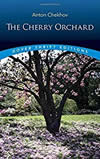 90. The Cherry Orchard by Anton Chekhov (1999) [Book #11/305]
90. The Cherry Orchard by Anton Chekhov (1999) [Book #11/305]
Chekhov is definitely a subtle and complex writer. Often, when you finish reading one of his plays or short stories you are left with a feeling that you had missed a ton of hidden messages within the story. He is an expert at layering story elements, particularly with his plays, where there are whole depths of meanings just waiting to be explored. The Cherry Orchard is one of his few plays, but likely the best writing that he had done. The main part of the plot follows a mother who returns to her farm after her son had drowned and continues as she slowly loses that farm. A complex, emotionally-deep story about coping with loss. Although many of Chekhov's stories can be underwhelming, I find his plays are usually on the better end of his range and I definitely recommend this one.
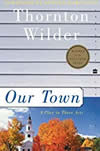 91. Our Town by Thornton Wilder (March 2009) [Book #82/305]
91. Our Town by Thornton Wilder (March 2009) [Book #82/305]
While reading Our Town, I found that the play makes a whole lot more sense if you read the preface in addition to reading/watching it. From the outside, the play appears to be about a normal American family, but if you read the preface you would know that there is more than that. The family is meant to be timeless, which is a thing that was not known around Wilder's time. All the concurrent plays were grounded in specific eras, whereas Wilder removed all props and set pieces to give the play a timeless quality. Our Town is about any town in America, and about any family. And although it still feels a little dated, it actually has remained quite timeless. The plot was fairly simple and easy to follow; about a family growing up, loving, and dying, in a small American town. However, upon finishing the play I had this feeling that I was missing something. I'm still not quite sure what that was, but I did enjoy it.
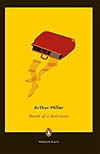 92. Death of a Salesman by Arthur Miller (1998) [Book #10/305]
92. Death of a Salesman by Arthur Miller (1998) [Book #10/305]
Death of a Salesman is often considered to be one of the greatest plays of the 20th century. The play is about a a salesman named Willy Loman, who undergoes severe depression that quickly spirals out of control as he sees his life crumbling apart. The best part about the play is that it is made up of real life characters, whom the viewer (reader) can sympathize with. It is the strong emotion and the treating of the characters as if they are real people in real-life situations that has made this play resonate with so many. The story offers a view into the real-life world of depression and what could go wrong if nothing is done to help the depressed. Heartbreaking to say the least.
Philosophy
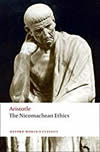 93. The Nicomachean Ethics [AKA Ethica Nicomachea] by Aristotle (May 2009) [Book #84/305]
93. The Nicomachean Ethics [AKA Ethica Nicomachea] by Aristotle (May 2009) [Book #84/305]
Generally I have found the Philosophy books to be a weird mix of "well, duh" and "what is going on here". The Nicomachean Ethics in particular, is a difficult book to describe because much of what Aristotle goes into is common sense today. In the book, Aristotle goes through and describes each of our emotional attributes and describes the extremes of them; from bravery to cowardice, and so on. The result of his analysis was that the middle of the road response in most cases was the "good" response and that most people should strive to be "good" people. Overall, I felt like I was reading a treatise on the seven deadly sins and I did not gain much from it afterwards. I can't imagine ever having to recommend this to anyone.
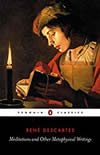 94. Meditations [AKA Meditations on First Philosophy] by Rene Descartes (April 2009) [Book #83/305]
94. Meditations [AKA Meditations on First Philosophy] by Rene Descartes (April 2009) [Book #83/305]
Meditations is only the first part of a two part work. The second part compiles the objections and replies that Descartes received to his original manuscript of Meditations, which he sent out to a few colleagues. Within the text, Descartes recommends reading both before making any assumptions about the work. I personally only wanted to read Meditations, so I opted to read a condensed version of the Objections and Replies, reducing the 300 pages down to about 35. Anyway my feeling on the work of Meditations did not change. In general, the work is written in a very abstract way, where one has to reread the sentence several times just to understand what Descartes is trying to say. During the times that I can actually understand his point, I found that he makes a lot of sense. He postulates that if he can make it seem as if nothing existed then he could prove that everything exists; based mostly on the fact that he is a being capable of thought. Most of this I could follow and I would agree with. Although I found his proof on the existence of God rather circular, as several of the objections also said, and I never saw anything in his writing that proved otherwise. In general a pretty interesting work, but I would not be likely to recommend it to anyone. As for the Objections and Replies, I couldn't find anything in there worth reading that would expand on the original work. The objections were interesting but Descartes' replies seemed almost nonsensical.
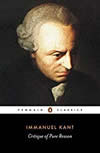 95. Critique of Pure Reason by Immanuel Kant (November-December 2014) [Book #128/305]
95. Critique of Pure Reason by Immanuel Kant (November-December 2014) [Book #128/305]
The Critique of Pure Reason is one of eight books under the "Philosophy" section in the Sybervision Book List. Traditionally, these, along with the Science books, have not fared too well in my opinion since I read these stories mainly for entertainment and judge them under that criterion. The most notable exception being Walden, which I greatly enjoyed. Well, the Critique of Pure Reason also has many of the same flaws as the other Philosophy or Science books. The text is often hard to decipher and the author frequently uses vocabulary words that the reader is more than likely never to encounter again. I stopped reading the chapter and section titles because they were more often than not undecipherable. I read the unabridged version of the text, and I can now understand why they have abridged versions. More than once I found myself thinking that the author takes 10-20 pages to say something that he sums up in one line, and likely could have been left at just that one line. This book would improve greatly with a good abridgment. As I trudged my way through the first half of the book, I thought that the book was essentially nonredeemable, with the author bloviating on about "simple" concepts that should have been wrapped up hundreds of pages earlier. Kant breaks down every possible concept imaginable using strictly a priori (independent of experience) reason. Starting with the second half though, he starts to explore the foundations of God and whether he exists or not using the a priori reasoning. In the end he concludes that no, you can neither prove or disprove the existence of God. I would equate this to one of the most fundamental Agnostic reading materials created and it actually got rather interesting to read (for the majority of the second half). In summary, although the text could use for quite a bit of shortening, I was pleasantly surprised about the topics that were addressed. Even though I would not recommend others to read this, I am glad I did.
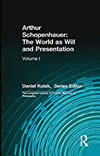
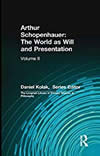 96. The World as Will and Idea (AKA The World as Will and Presentation) by Arthur Schopenhauer (November 2016-June 2017) [Book #137/305]
96. The World as Will and Idea (AKA The World as Will and Presentation) by Arthur Schopenhauer (November 2016-June 2017) [Book #137/305]
At long last I have finished the more than 1300 page drudge that is The World as Will and Presentation. This is the last philosophical books that are on the list and I am the more happy because of it. Schopenhauer states in the intro that to truly understand the work, you should read it twice. I am not going to do that because honestly, it didn't interest me nearly that much. The premise of the book is that everything in life can be broken down into two categories, the Will and the Presentation (or the Idea, or Representation, all based on translation). The Will is the desire that resides in all of us. It is the will to live, the will to eat, the will to want what we (and everything) wants. The Will is everything inside us. The Presentation is how everything appears to us from the outside. It is how the world looks through our eyes. It is everything outside of us. Like most philosophical works, Schopenhauer proceeds from the small and works to the larger, to the point where he is trying to explain everything from religion to science within the concepts he has stated. The problem with the work, and one that he seems to fail to notice, is that the book is way over bloated. He states almost identical phrases on numerous occasions and has a tendency to use 100 words to state something, when 10 would have done the job just fine. This book could easily be condensed down to a quarter it's actual size and have had all the depth and meaning that the original had. He needed an editor. That's not saying that the book isn't any good, it is, but only in parts. I occasionally found sections that I was deeply enraptured in but, but they were few and far between. It was like eating a bowl of cheap Raisin Bran, there were occasionally instances of delicious raisins, but mostly it was just bran. Also, one thing needs to be understood about this book. It is a product of it's times. Just like The Origin of Species, the science in The World as Will and Presentation is outdated and often insulting to the reader, where he makes general assumptions and runs with them (like everyone gets their intelligence only from their mother and that women are obviously the weaker sex that needs a man for everything). Reading this as a historical philosophy work and not a scientifically modern text is essential for getting the most out of the text.
In order to get the "full experience" from this book, it seemed that there needed to be some prerequisite reading. His entire philosophy is based on the works of Immanuel Kant. Luckily I had happened to read The Critique of Pure Reason before reading this book, but if I hadn't, I likely would have been mildly lost. He also mentions Descartes (Meditations) a lot, which again is useful to read beforehand. The one thing though that he insufferably keeps mentioning is his other "prize essays". It's rather sickening the amount that he mentions them, however the one true drawback was that he wrote this book with the assumption that the reader is fully acquainted with his essay "The Principle of Sufficient Ground", which obviously I had not read but apparently should have. The organization of the book is divided up into the main text, an appendix, and supplements to the text, totaling over 1300 pages. The main text only makes up about 475 pages of the document with the appendix finishing out the 600 page Volume 1. Volume 2 (all 700+ pages of it) is entirely made up of the supplements to the text. I wish I had known that the supplements are directly related to the chapters in the main text and broken up as such, otherwise I would not have read through the text cover to cover. If I had to do it over again, I would read the supplements in relation to the chapters as I was going through each chapter. Reading the book cover to cover, it felt as if I had read the main text twice. Once the first time, then again as an over bloated version in the supplemental chapters.
In general, the translation of the text can make or break this work. I am using the most up to date translation (Richard E Aquila's) and I believe it had made the difference. Often German to English translations feel rather clunky, however this one was remarkably easy to understand and process the information. A worse translation could have made this from a drudge to downright incomprehensible. Also, even though the author is extremely arrogant, he is also rather amusing by frequently insulting and mocking his contemporaries. It adds a bit of levity where this could be considered a very dry text. All in all, I would only recommend this text if you can get (1) A good translation and (2) a good abridgment of the text and (3) if you are into philosophical texts. The full version is not worth the effort of wading though, however the bits of wisdom sprinkled throughout the text did pique my interest sufficiently that I will go back to those specific section when I have more time.
 97. Nature by Ralph Waldo Emerson (July 2008) [Book #75/305]
97. Nature by Ralph Waldo Emerson (July 2008) [Book #75/305]
While reading through the 100 Greatest Books I sometimes have difficulty in determining exactly which books the list creator was referring to. This was one of those problem books. It turns out that Emerson wrote three different works entitled Nature and I was resolved to read all of them until I came across a website that stated that his first Nature was published in 1936 was the most prominent of the three. It was also the only Nature work published before Self-Reliance, and since the Sybervision Book List is listed chronologically, I assumed that the original Nature must be the one being referred to. Overall, Nature was not all together as exciting or interesting as I thought it would or could be. By far I feel that Thoreau had the same ideals and intent but had managed to portray them in a better way. So, it turns out that Emerson is not one of my favorite philosophers, but I can see how his work might have been groundbreaking at the time.
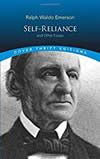 98. Self-Reliance by Ralph Waldo Emerson (July 2008) [Book #76/305]
98. Self-Reliance by Ralph Waldo Emerson (July 2008) [Book #76/305]
After having read the original Nature, I was not looking forward to continuing to read Emerson, however this was a very short read and that always helps me power through if need be. Reading Self-Reliance had actually improved my opinion of Emerson. I found it difficult to understand what Emerson was talking about a lot of times in Nature. However, Self-Reliance was anything but difficult, it was straight forward and actually provided a good lesson. Self-Reliance was about how man (and woman) have become too reliant on other people and things and that they are no longer their own person. Emerson stated that we need to break free of the things we rely on to truly become individuals. Only the individuals are remembered through history, not the ones who just copied other people. Overall a relatively straightforward and easy read with a positive life lesson.
 99. Walden by Henry David Thoreau (November - December 2006) [Book #54/305]
99. Walden by Henry David Thoreau (November - December 2006) [Book #54/305]
Also on My Book list - While most of the books on my lists are strictly fiction, there are a few that delve into other aspects of history such as scientific and philosophical works. Walden was my first dip into these other, more intimidating, works of literature. And when I started this book I was expecting a rather long, dry, dull book, but in the end, I was pleasantly surprised. Although this is listed as a philosophy book, it reminded me much more like an amateur scientist exploring the world and describing what he sees. Walden is written in a language that is poetic and enjoyable to read where Thoreau will often comment on aspects of his society that are still prevalent today; including helping the needy and people living just to make money. The premise of the book is that Thoreau wanted to live outside of society, with no reliance on it and in the end he succeeded, for the most part. This work impacted me so much that a line within the story has become my email tag since reading it:
"I went to the woods because I wished to live deliberately,
to front only the essential facts of life,
and see if I could not learn what it had to teach,
and not, when I came to die,
discover that I had not lived."
I feel that for an educational experience this book should definitely be on everyone's list.
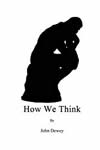 100. How We Think by John Dewey (May 2012) [Book #106/305]
100. How We Think by John Dewey (May 2012) [Book #106/305]
As may be imagined, this falls under the "Philosophy" section of the Sybervision book list. I have usually been a bit harsher on the books in Philosophy Section, along with the "Science and Civilization" books, because I am reading them for enjoyment and that is how I am going to rate them. A lot of the books in these sections read as if they are textbooks. Not this one though. This reads as if it were a journal article. The difference being that a textbook contains very little meaningless information because it is created to be as concise as possible. On the other hand journal articles usually are padded with "non-essential" information, i.e. background information and other ancillary stuff. That is how this book read. It was a discussion of, coincidentally enough, how we think. The author went into various ways we, as humans, think and then into different scientific explanations. Overall, I felt this was a rehash of what was blatantly obvious, but the "article" did make me think. It brought up points that I enjoyed and had not actually thought about before, but overall I felt it was long and drawn-out and shouldn't have been added to the list. A definite not-recommend.
